CSR Leaders Reshaping Workforce Development through Digital Reskilling
Meet the CSR leaders transforming workforce development through digital reskilling, empowering communities, and driving lasting social impact in the digital economy.
Table of contents

Meet the CSR leaders transforming workforce development through digital reskilling, empowering communities, and driving lasting social impact in the digital economy.
Corporate Social Responsibility (CSR) has evolved into a crucial strategy for businesses shaping a fairer future. As industries embrace automation and digital technologies, CSR addresses key challenges—especially in education and workforce development. Companies are not just focusing on profit; they’re building a stronger, more inclusive workforce through digital reskilling, particularly for marginalized communities.
With millions of jobs expected to change or disappear, marginalized groups face a higher risk of exclusion from the economy. Forward-thinking leaders are stepping up by investing in education and upskilling programs, helping people adapt and thrive in the digital world.
This article celebrates top CSR and HR leaders driving meaningful social impact. Their initiatives break barriers, open opportunities, and prepare a workforce ready for the digital age: combining business goals with societal good to shape a more equitable future.
The rapid growth of the digital economy is creating a significant skills gap. According to the World Economic Forum, over 85 million jobs may be displaced by automation by 2025, while 97 million new roles will require updated skills for a digital-first labor market. This shift makes digital reskilling crucial, especially for those vulnerable to job displacement.
Marginalized communities face additional barriers such as limited access to technology, financial constraints, and systemic inequalities. Without digital skills, these groups risk long-term unemployment or being trapped in low-paying, unstable jobs.
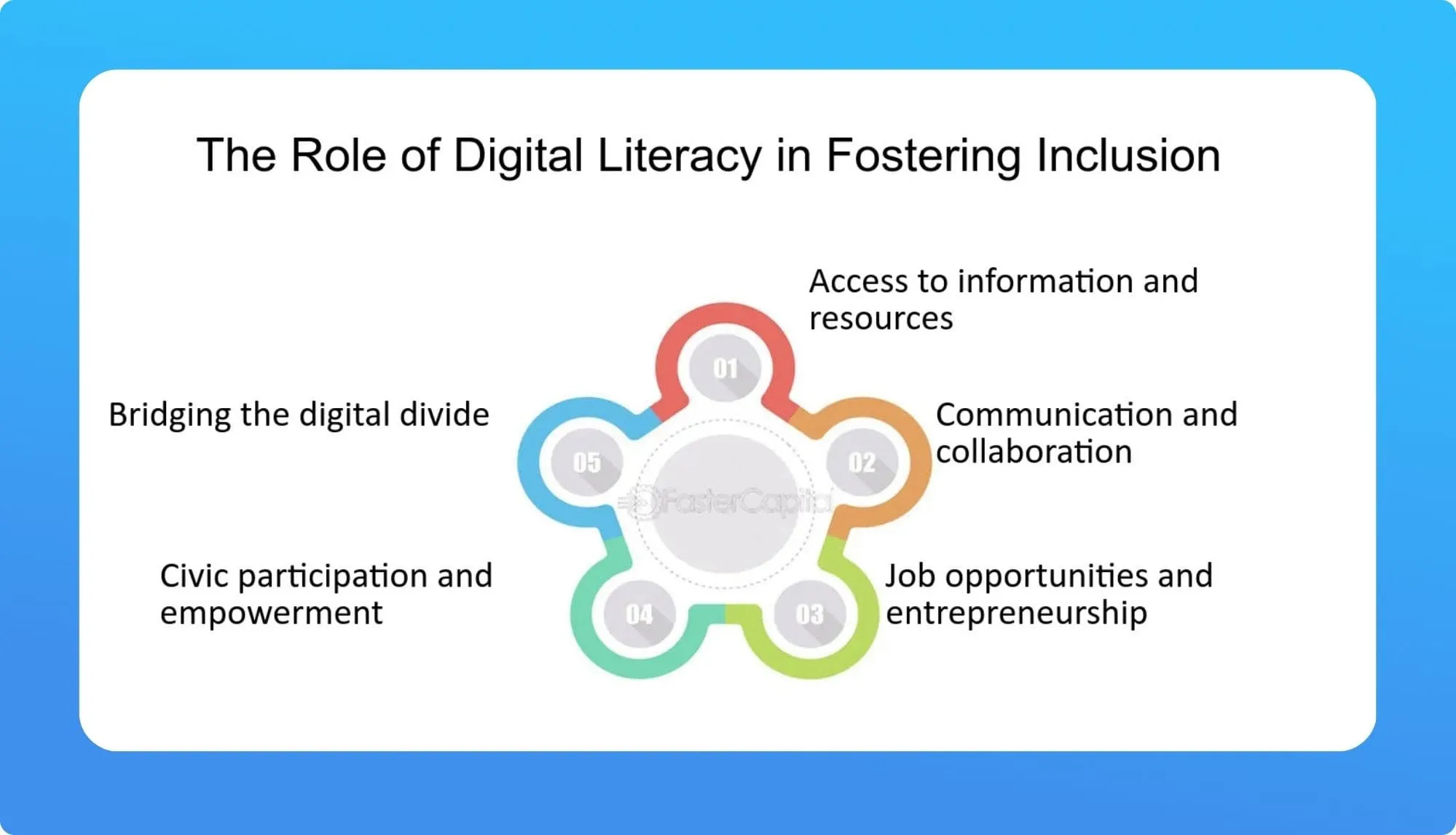
To address this, companies like Verizon and Walmart are leading CSR initiatives focused on reskilling. Verizon’s Citizen Verizon aims to provide 10 million youth with digital skills training by 2030, while Walmart’s workforce development programs offer comprehensive upskilling for both employees and the community. These efforts help bridge the digital divide, empowering marginalized individuals to actively participate in the future economy.
Citizen Verizon: Verizon’s plan for economic, environmental, and social advancement
CSR has become a driving force in promoting inclusive growth and workforce development. Once viewed as the responsibility of governments and educational institutions, this task is increasingly being led by businesses preparing workers for the future.
Companies are investing in training, mentorship, and career development opportunities that benefit not just their employees but the broader community. Delta Air Lines’ Close the Gap strategy focuses on equitable leadership for women and people of color, while Boeing’s Global Engagement programs support STEM education and workforce development, especially for women and girls.
Corporate leaders are key advocates of these efforts. Executives like Kathleen McLaughlin of Walmart and Asahi Pompey of Goldman Sachs lead initiatives that align business goals with long-term social impact, ensuring their companies contribute to building a skilled and inclusive workforce.
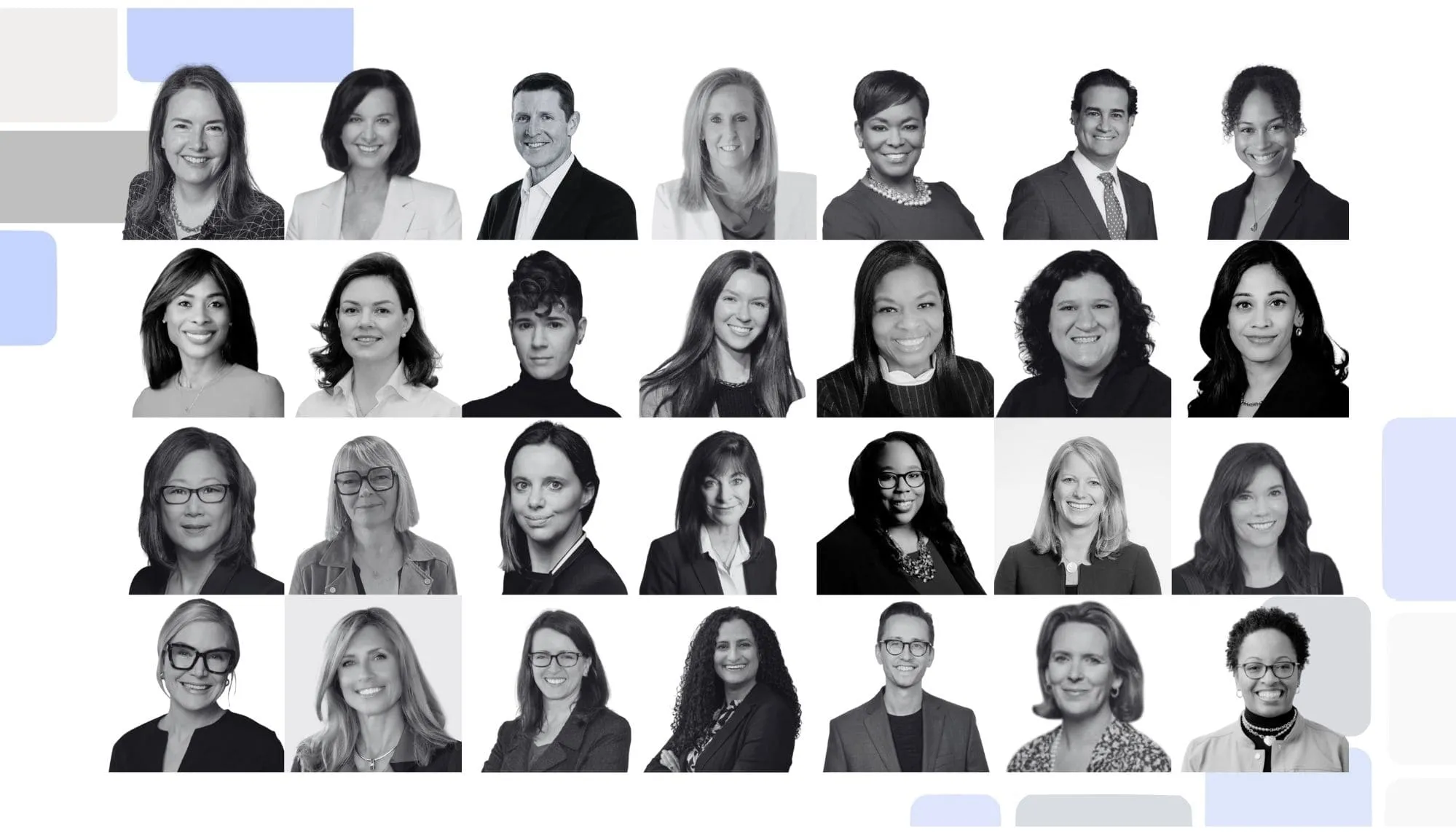
By aligning business goals with CSR, these leaders are fostering sustainable workforce development that benefits both their organizations and the communities they serve. As the demand for new skills grows, their CSR commitment ensures more individuals have opportunities to thrive in the digital economy.
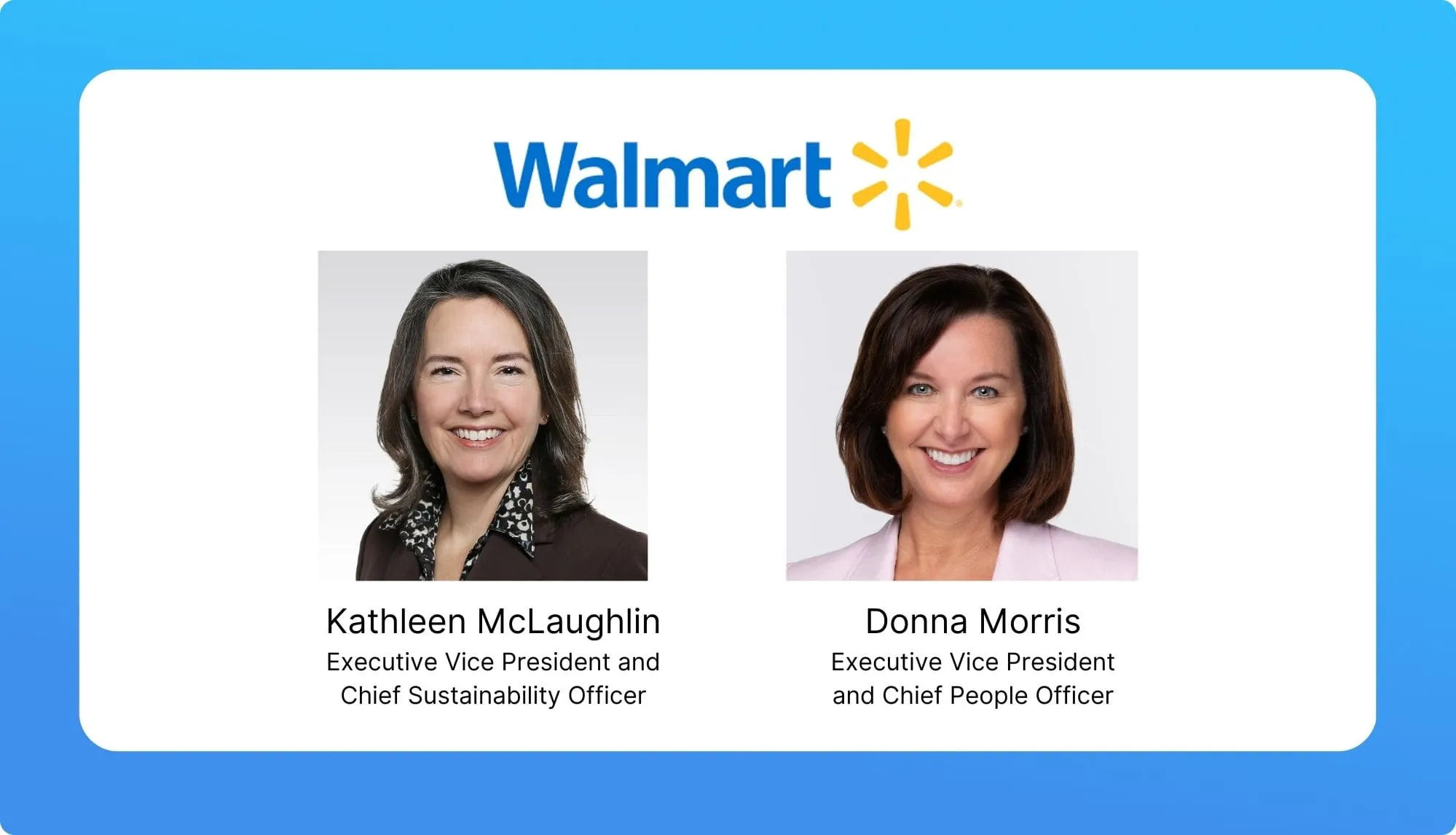
Since 2013, Kathleen McLaughlin has spearheaded Walmart’s sustainability and workforce development efforts. As Chief Sustainability Officer, she integrates environmental goals with economic mobility initiatives through the Walmart Foundation, advancing digital reskilling and community development.
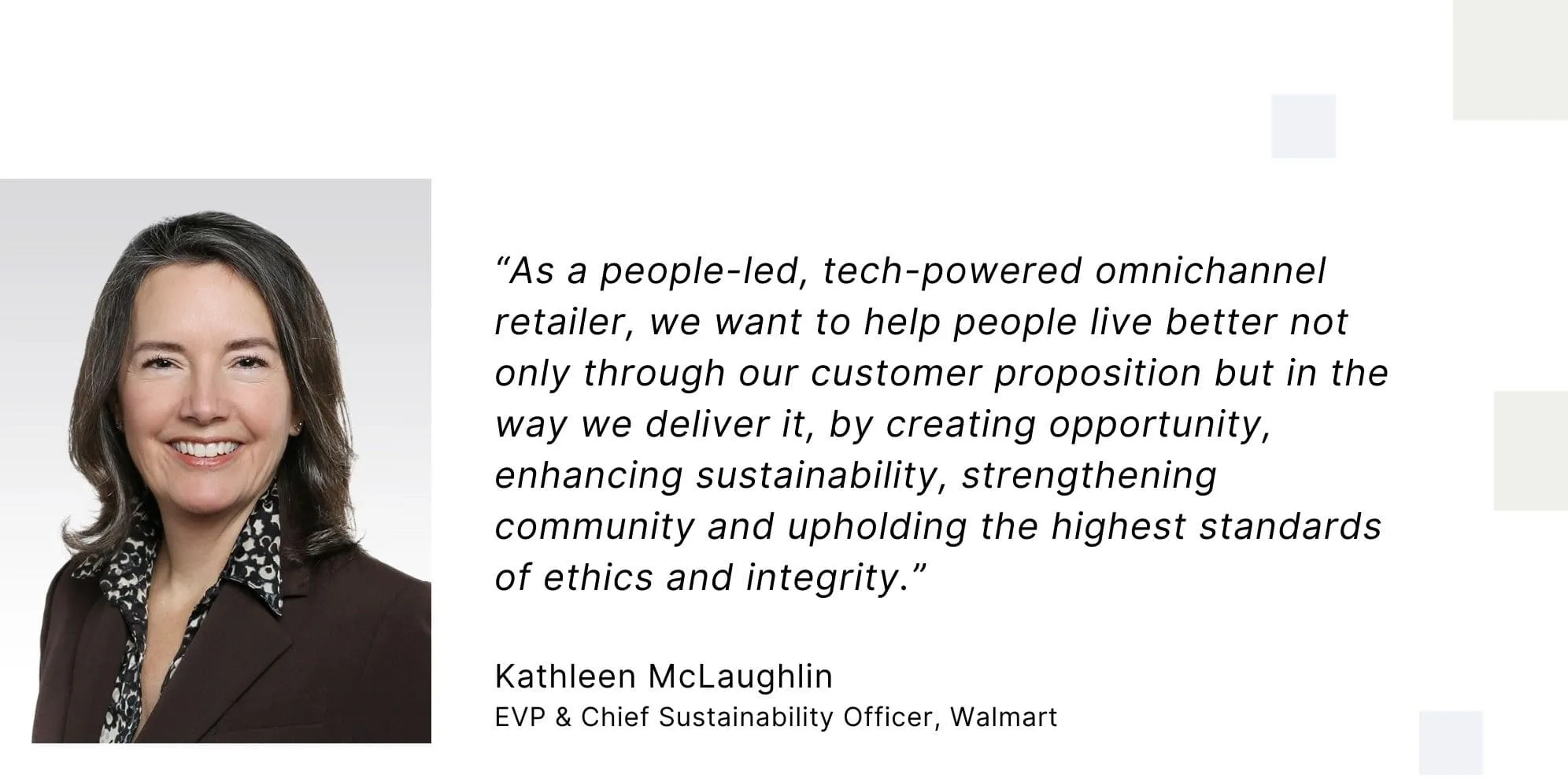
Donna Morris, who joined Walmart in 2020, oversees the well-being of Walmart’s 2 million associates. Her focus on inclusion and digital tools has enhanced employee experiences, securing Walmart’s reputation as a "Great Place to Work." Her commitment to diversity earned her a spot on Forbes' Future of Work 50 list.
Walmart’s initiatives foster economic mobility, sustainability, and a more inclusive digital economy.
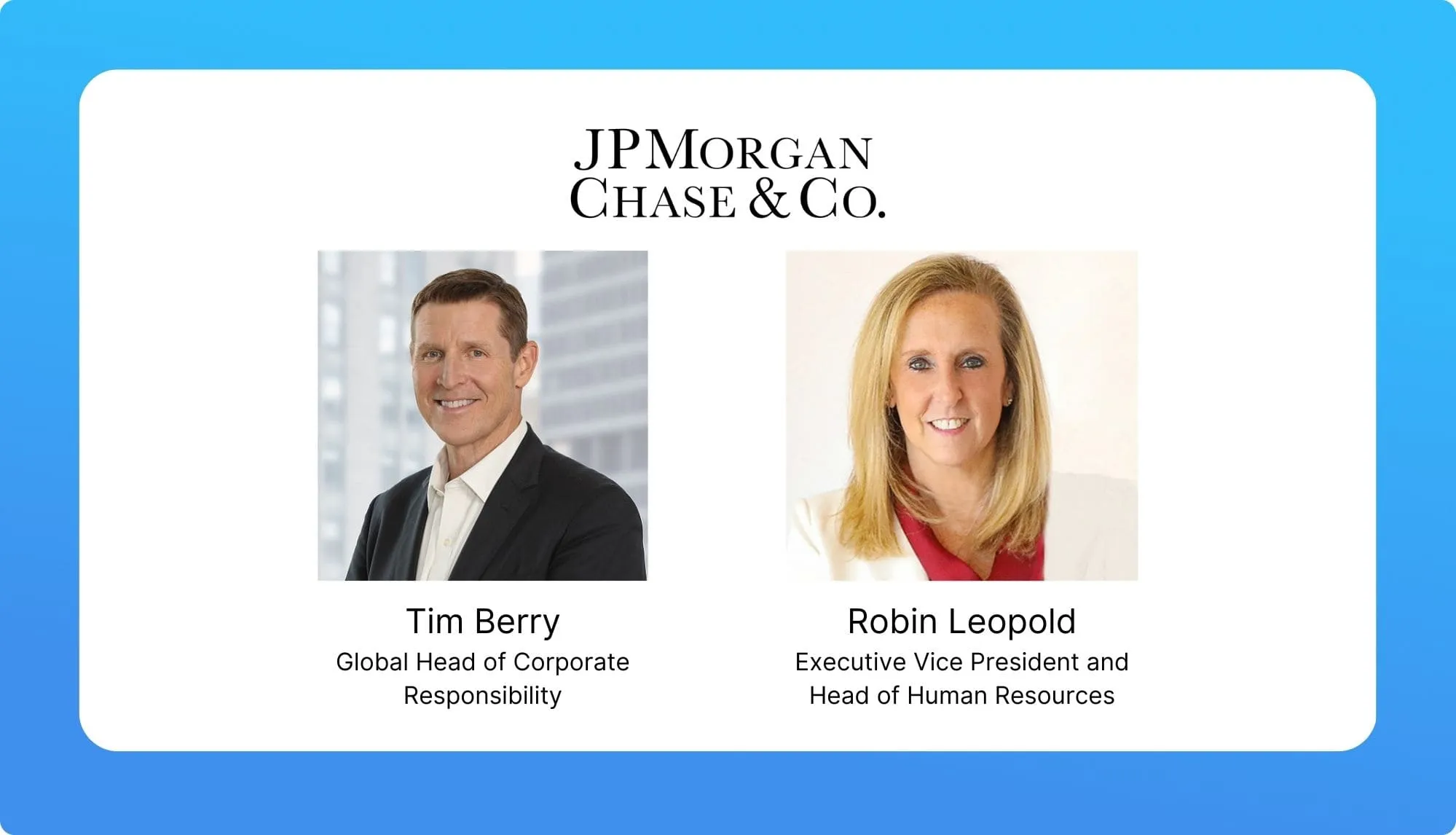
Tim Berry leads JPMorgan Chase’s global sustainability, philanthropy, and public engagement efforts. His leadership focuses on promoting inclusive growth and supporting the global transition to a low-carbon economy. Under Tim, the firm drives initiatives in five key areas: business growth, career development, community investments, environmental sustainability, and financial health.
Since 2010, Robin Leopold has shaped JPMorgan Chase’s HR strategy, prioritizing employee well-being, professional growth, and diversity. Her leadership has positioned the company as a workforce empowerment leader, ensuring employees thrive in a dynamic industry.
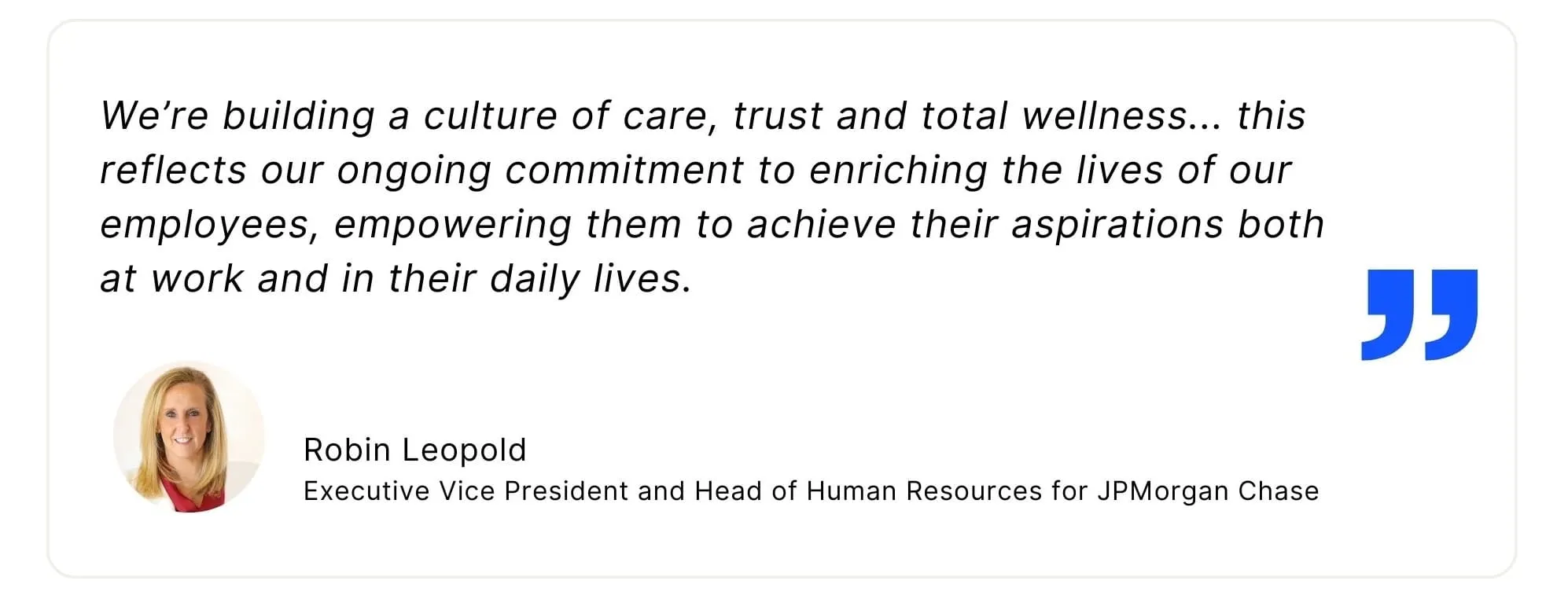
Through these initiatives, JPMorgan Chase promotes inclusive economic growth and sustainability, reflecting its commitment to social impact and business success.
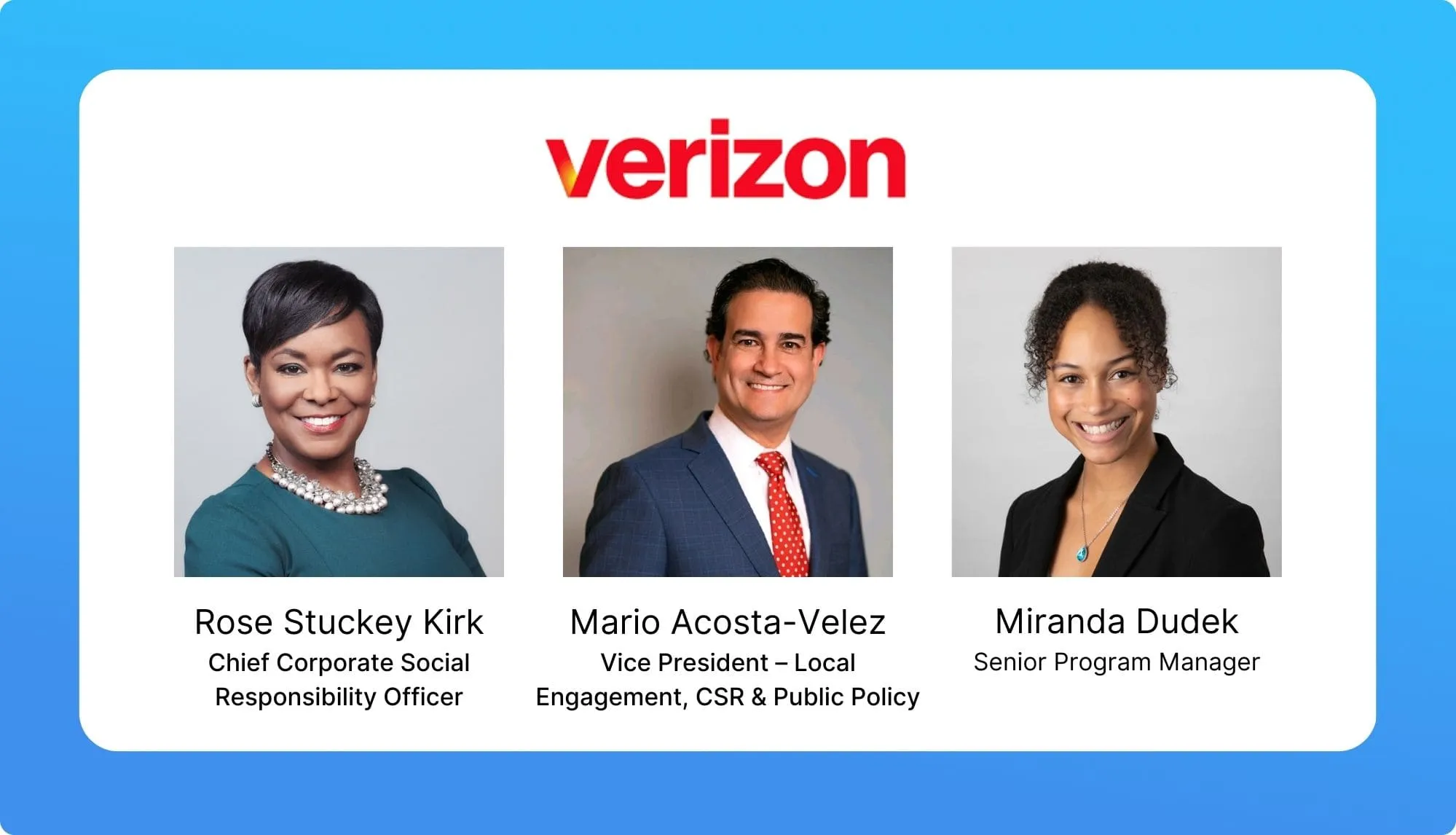
Rose Stuckey Kirk leads Verizon’s global CSR strategy, overseeing programs like Citizen Verizon, which aims to train 10 million youth in digital skills and support 1 million small businesses by 2030. With a focus on digital inclusion and sustainability, Rose’s work integrates social impact with corporate goals. She also produced the documentary Without A Net: The Digital Divide in America, showcasing her commitment to closing the digital gap for underserved communities.
Verizon | Verizon Innovative Learning | Without a Net
For over 15 years, Mario Acosta-Velez has led Verizon’s regional CSR efforts in the East Region, focusing on digital inclusion, education, and workforce development. His leadership in programs like Verizon Innovative Learning has strengthened digital access and supported small business growth in underserved communities.
Miranda Dudek manages Verizon Skill Forward, which provides free training and digital tools to help individuals reskill for the jobs of tomorrow. Her efforts support Verizon’s goal to prepare 500,000 people for future careers by 2030, focusing on marginalized groups to ensure success in the digital-first economy.
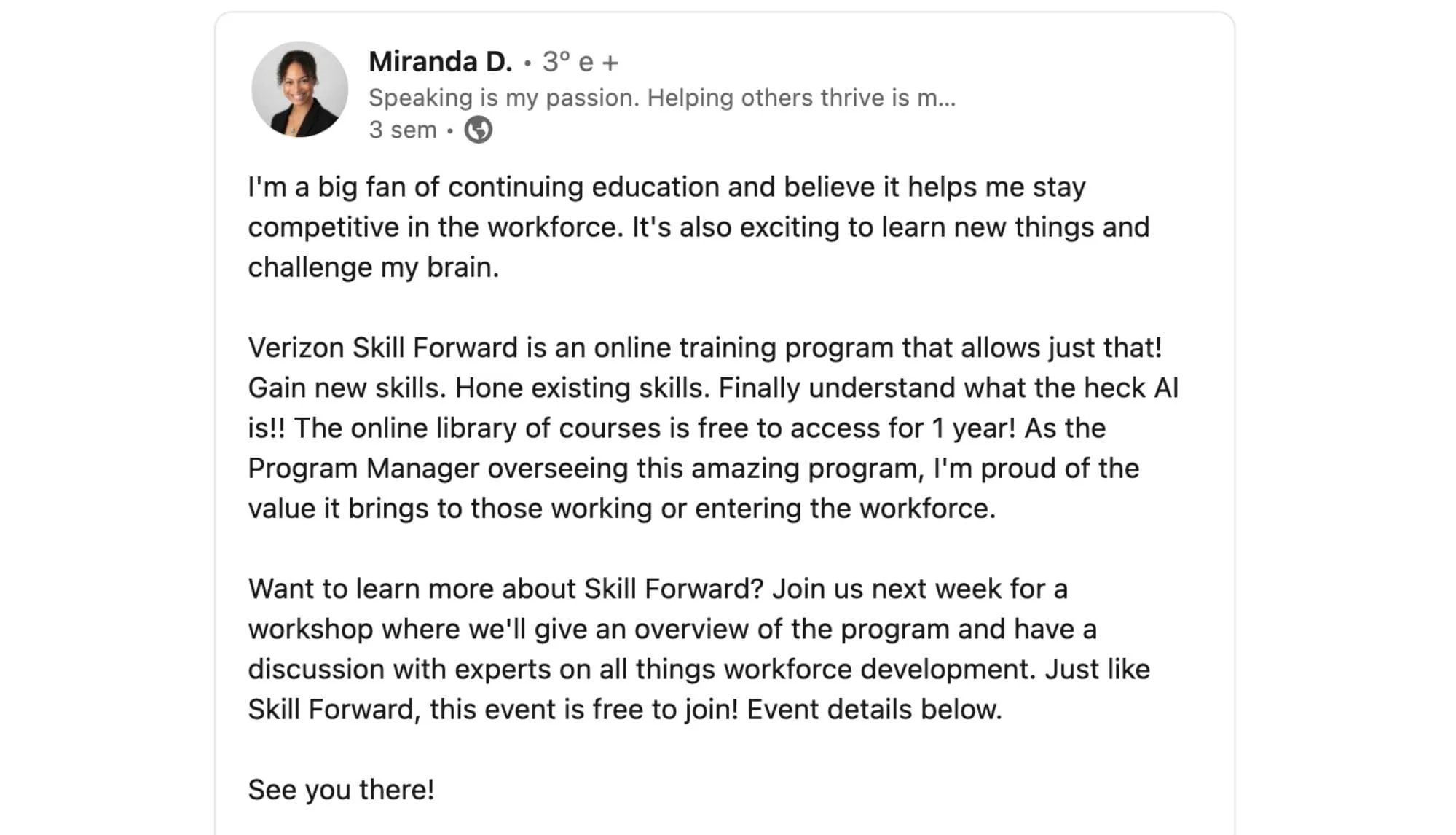
Verizon’s initiatives drive real change in education, economic empowerment, and community support, ensuring that communities thrive in a digital world.
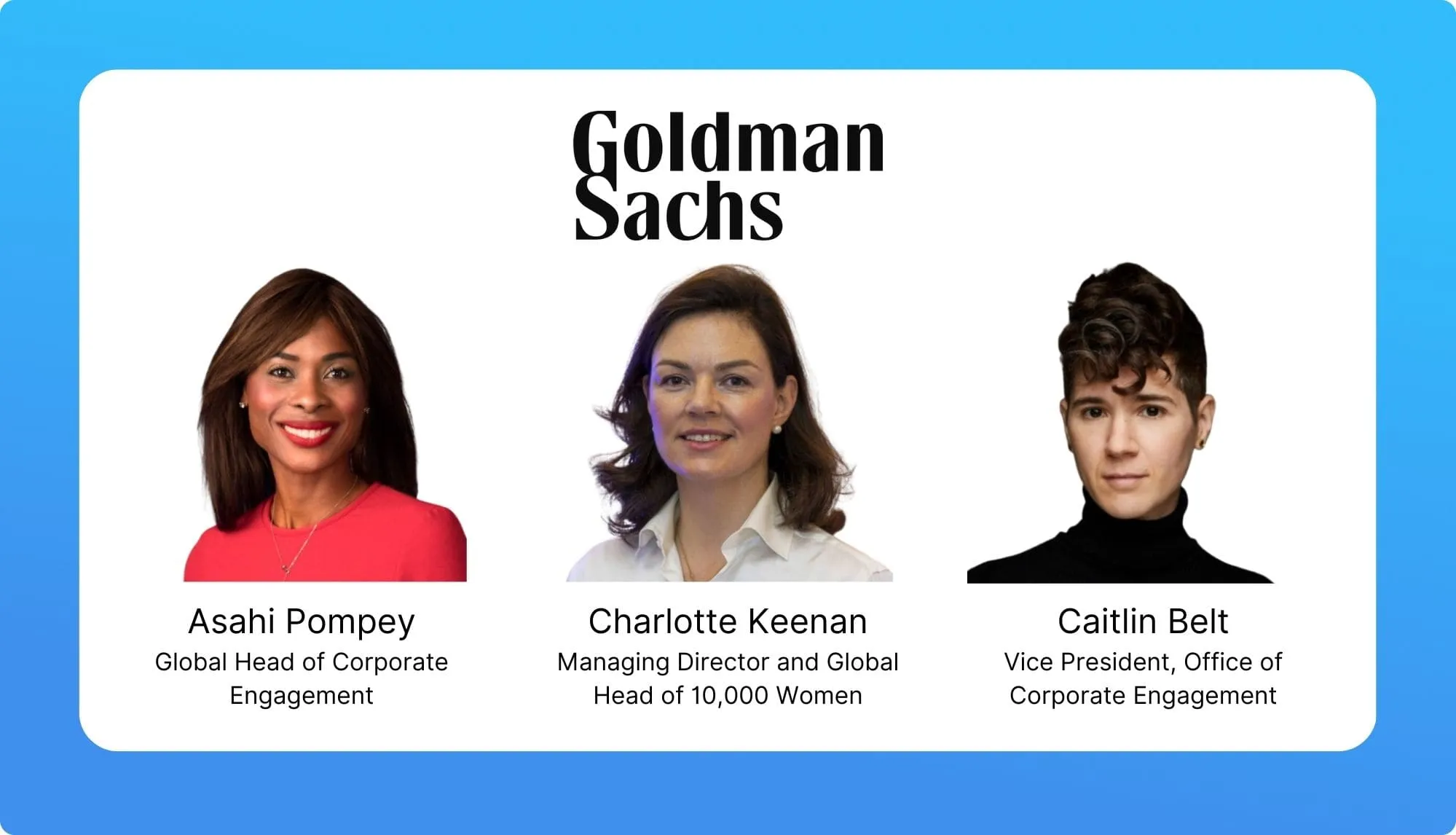
Asahi Pompey leads Goldman Sachs’ community engagement programs, including 10,000 Small Businesses, 10,000 Women, and One Million Black Women. She also oversees Goldman Sachs Gives, which has distributed over $2.5 billion in grants to underserved communities. Asahi’s leadership drives Goldman Sachs' social impact strategy, focusing on economic empowerment and diversity, especially for women entrepreneurs and small businesses.
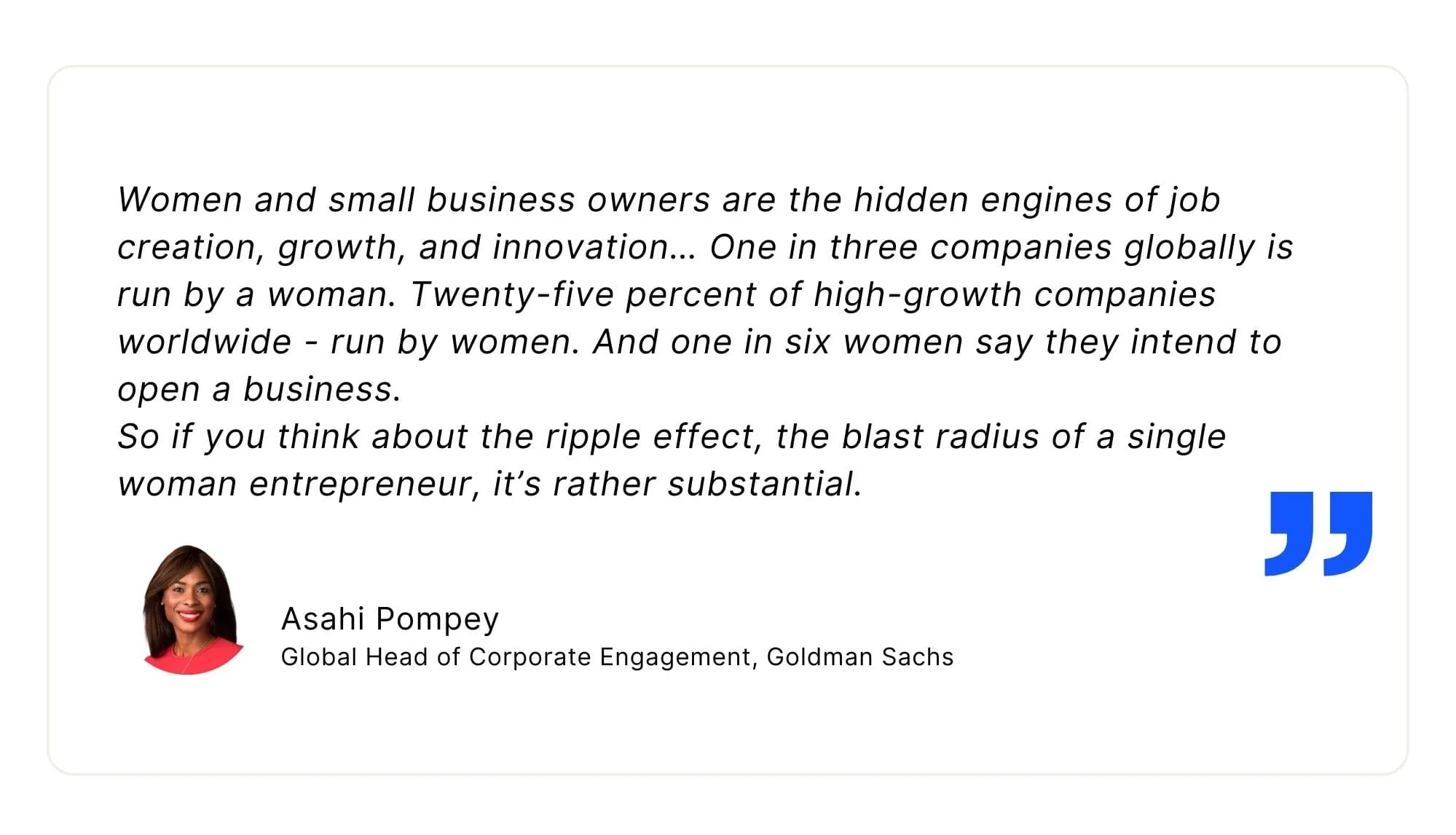
Since joining Goldman Sachs in 2015, Charlotte Keenan has expanded the 10,000 Women initiative, which provides business education and capital to women entrepreneurs in over 100 countries. Her work ensures these women have the tools and resources to succeed globally. Charlotte is also active in supporting small business growth through her role in the UK Government’s Scale Up Taskforce.
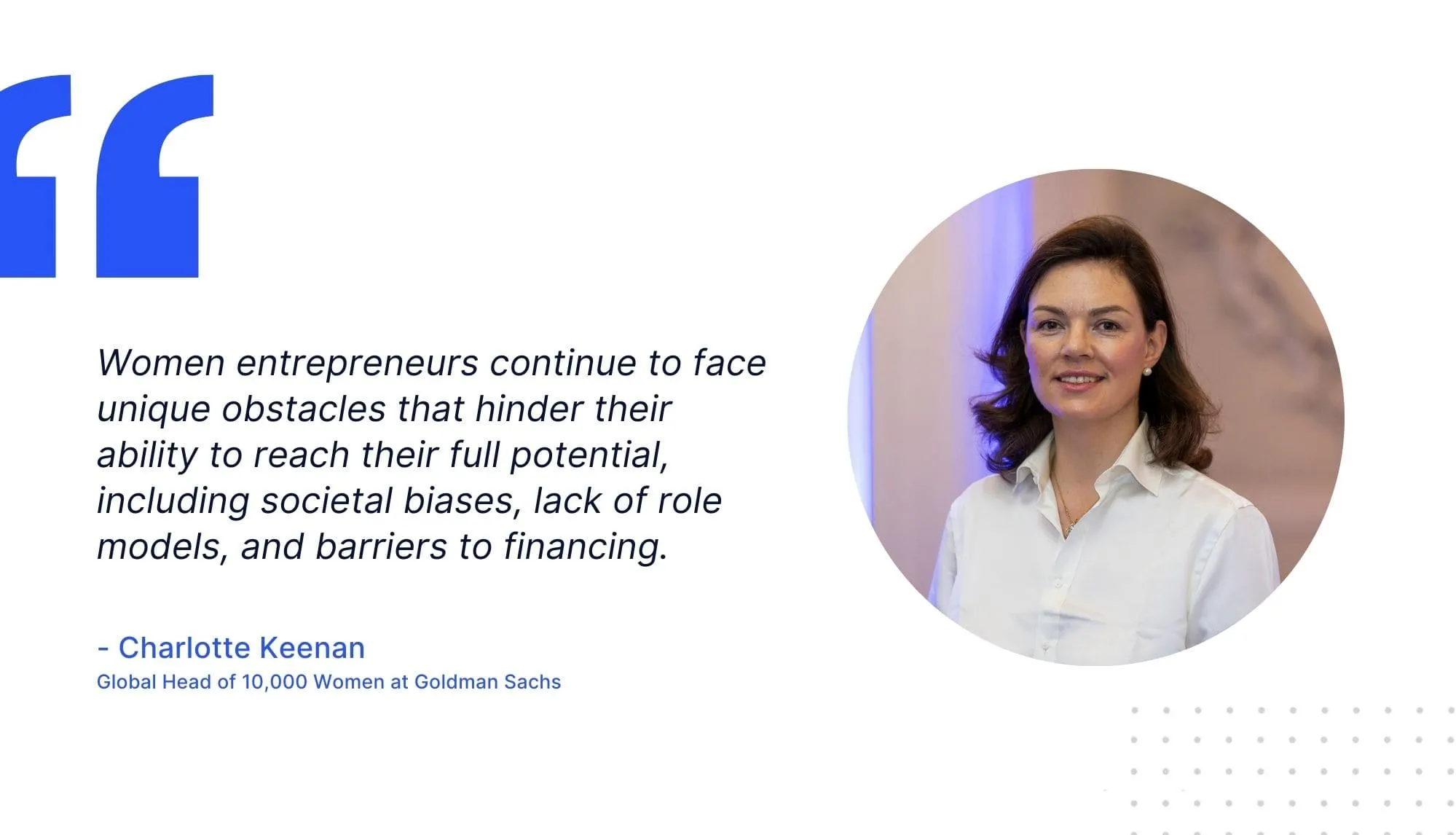
Caitlin Belt plays a key role in managing Goldman Sachs' philanthropic programs, including 10,000 Small Businesses and Goldman Sachs Gives, fostering economic opportunity and supporting nonprofits worldwide. She also oversees strategic partnerships with nonprofits and helps shape the firm's ESG reporting.
Goldman Sachs leverages its expertise and capital to create inclusive economic opportunities and support diverse communities worldwide.
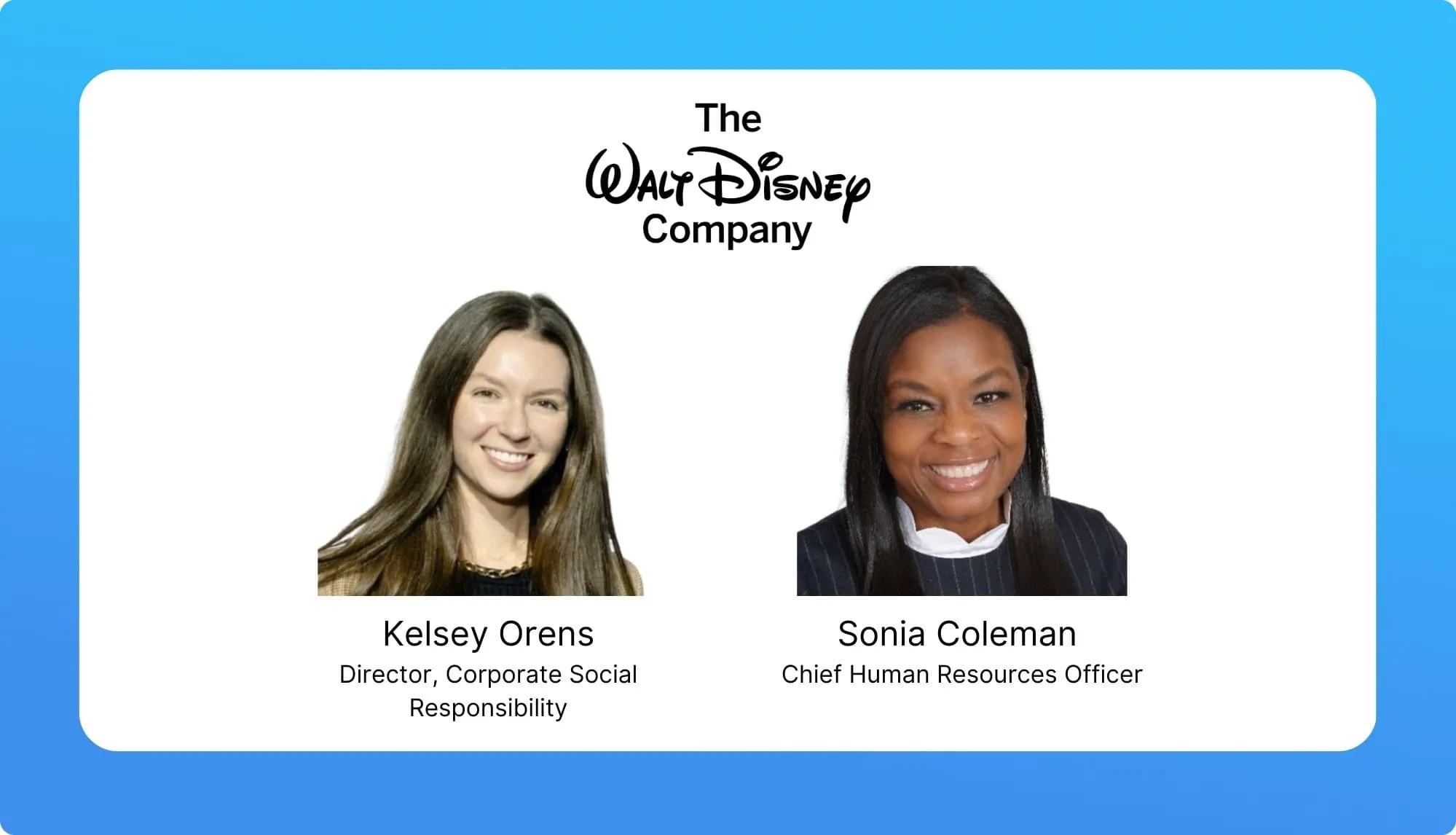
As Director of Corporate Social Responsibility, Kelsey Orens leads Disney’s community engagement and social impact efforts, with a focus on the Disney Future Storytellers initiative. This program inspires youth to explore careers in media, entertainment, and technology through mentorship, scholarships, and hands-on experience.
Kelsey’s leadership has extended Disney’s CSR reach, impacting millions of students globally through STEM education, scholarships, and partnerships with educational institutions. Her work also amplifies Disney’s community support through partnerships with nonprofits, bringing hope to children and communities in need.
Since joining Disney in 2008, Sonia Coleman has risen through HR leadership roles, becoming Chief Human Resources Officer in 2023. She oversees Disney’s global HR strategy, including talent acquisition, leadership development, diversity, and organizational design. Sonia focuses on fostering a people-centric culture, ensuring employees across all divisions feel supported and empowered.
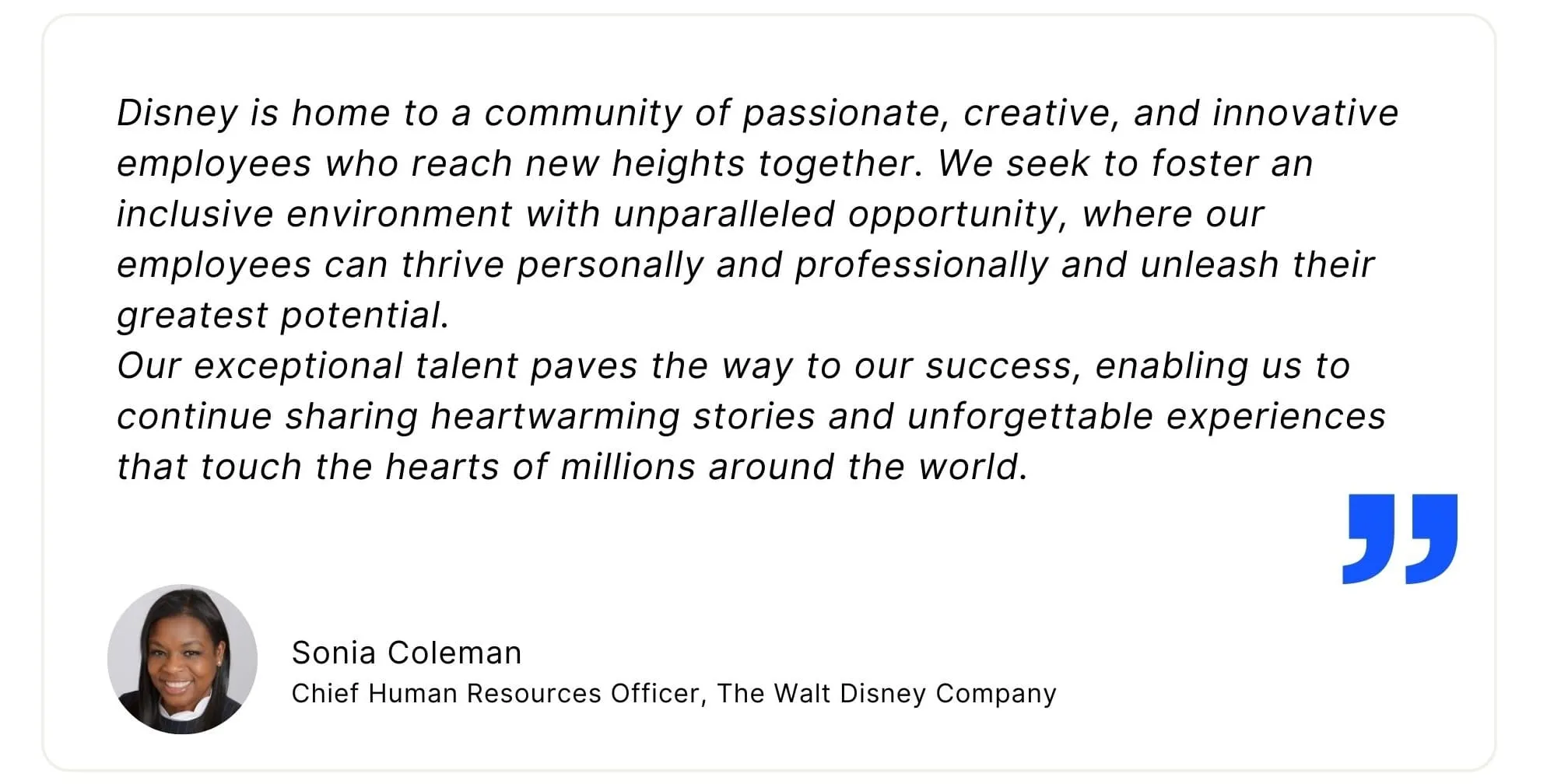
Under her leadership, Disney has prioritized career mobility, diversity, and employee well-being, fostering an inclusive environment that nurtures creativity and collaboration. Her efforts are key to developing Disney’s next generation of leaders.
Disney’s commitment to fostering future leaders, diverse voices, and community development ensures its lasting global impact.
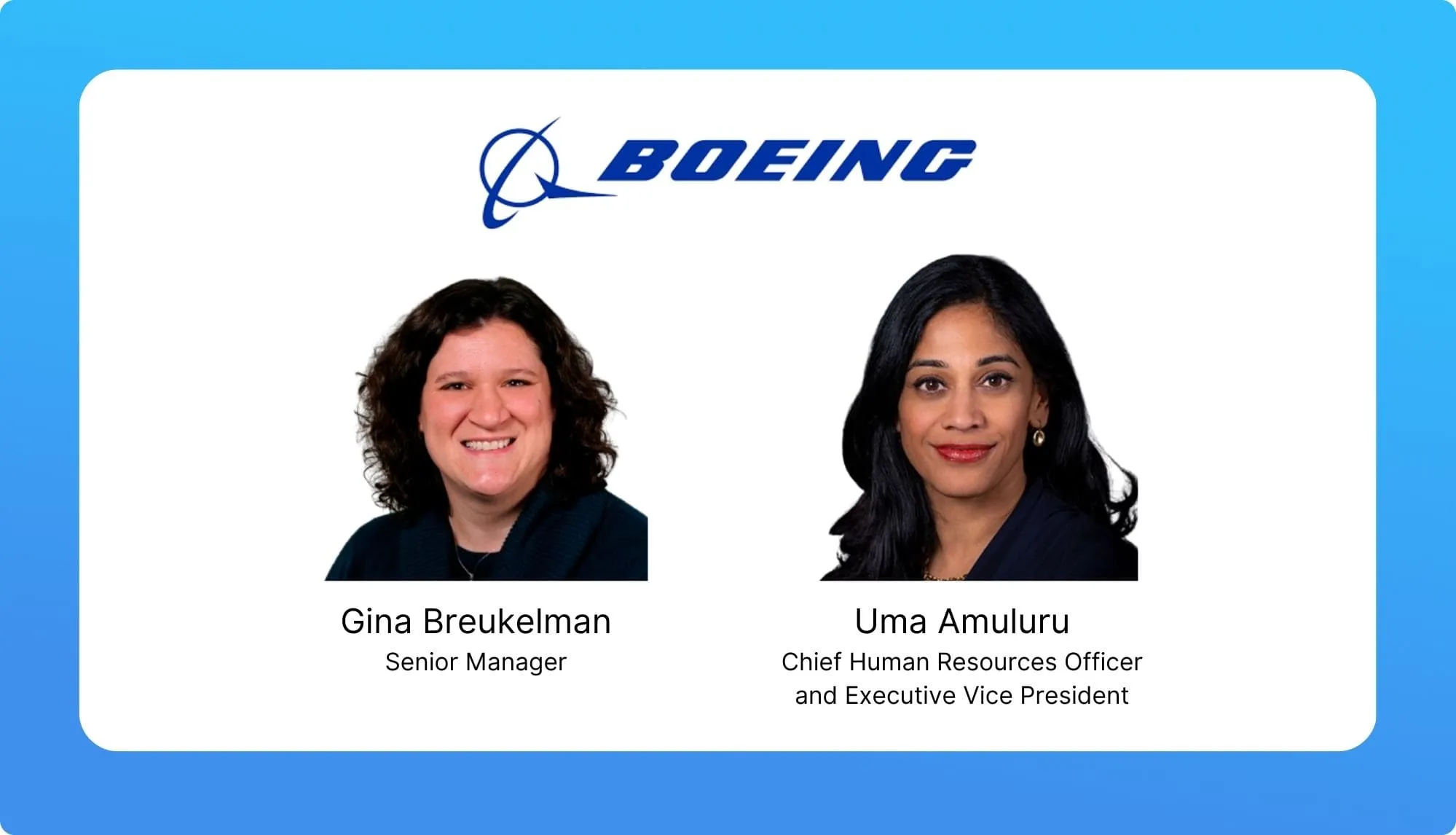
Since 2009, Gina Breukelman has led Boeing’s philanthropic and community engagement efforts in the Northwest. She manages corporate philanthropy, focusing on workforce development, education, and veterans' issues. In 2023, Boeing contributed $48.5 million to social impact programs, supporting over 2.2 million young women and girls through STEM initiatives. Gina’s leadership also helped fund 423 grants for education and workforce programs, fostering the next generation of innovators.
Appointed in 2024, Uma Amuluru leads Boeing’s global HR strategy, overseeing talent acquisition, learning, compensation, and diversity. Her focus on equity and inclusion aligns with Boeing’s goal to close representation gaps for women and minorities by 2030. Uma’s leadership promotes integrity, safety, and ethical conduct, ensuring Boeing remains a leader in both aerospace and workplace diversity.
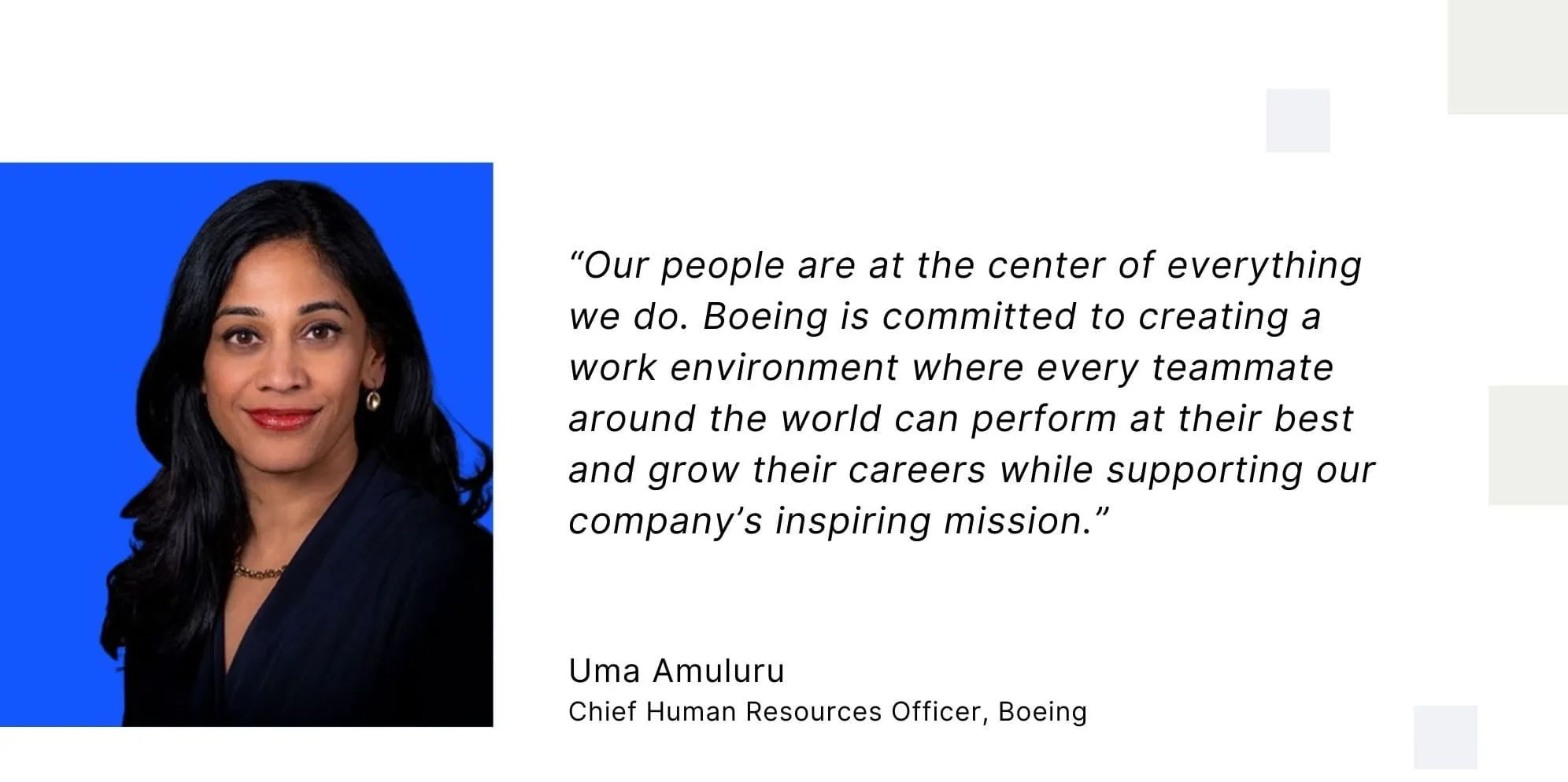
Boeing’s initiatives advance sustainability, inclusion, and innovation, positioning the company as a leader in aerospace and community development.
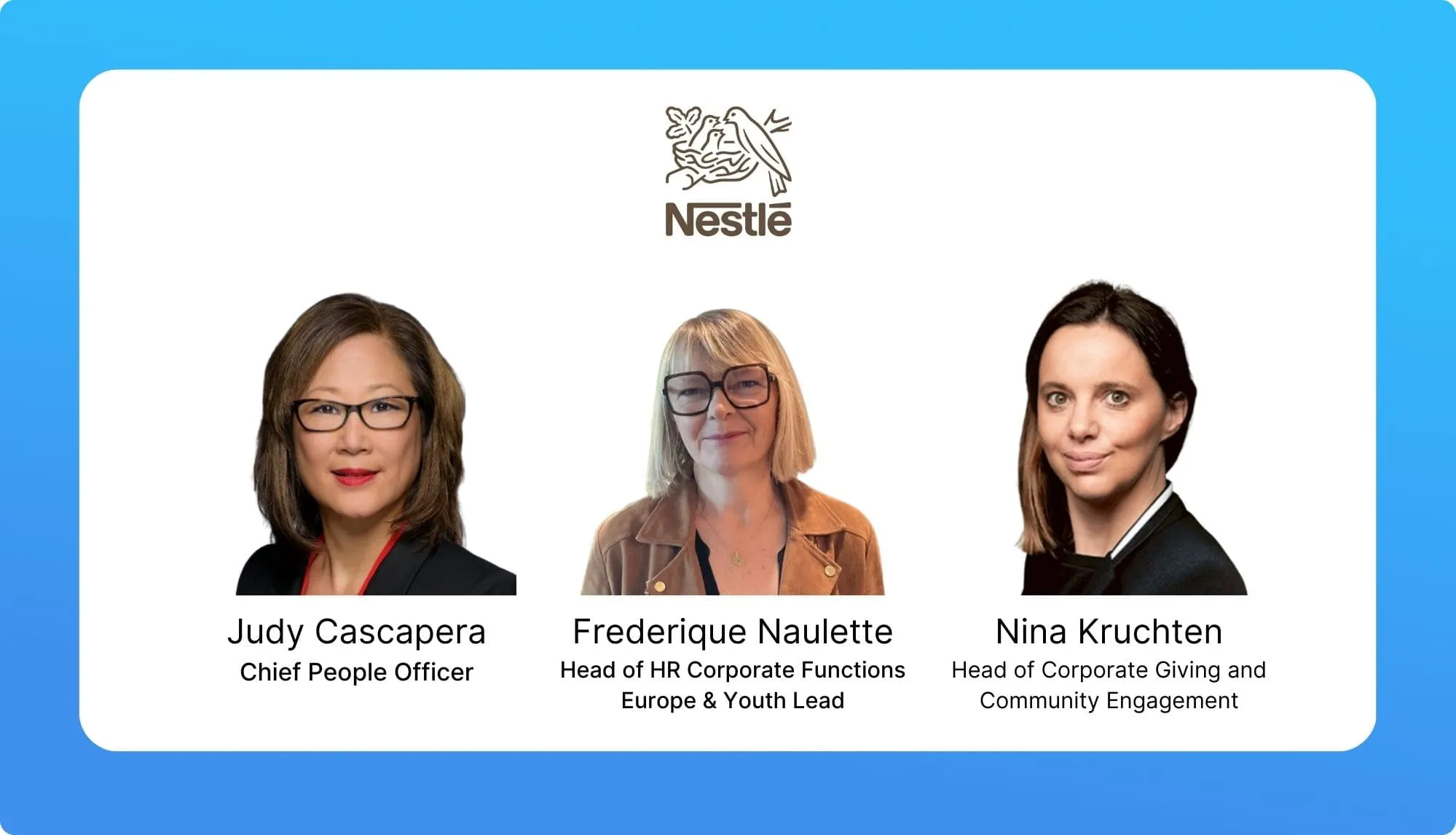
With over three decades of HR experience, Judy Cascapera oversees HR for Nestlé Zone North America and Nestlé USA. She focuses on employee well-being and diversity, equity, and inclusion (DE&I), ensuring that 46.4% of management roles are held by women. Her leadership fosters an inclusive environment where employees thrive both personally and professionally.
Frederique Naulette leads workforce development and youth employment efforts at Nestlé. She aims to provide economic opportunities for 10 million young people by 2030 through skills training, career pathways, and leadership development. Frederique also advances DE&I by creating programs that bridge opportunity gaps for young professionals and underrepresented groups.
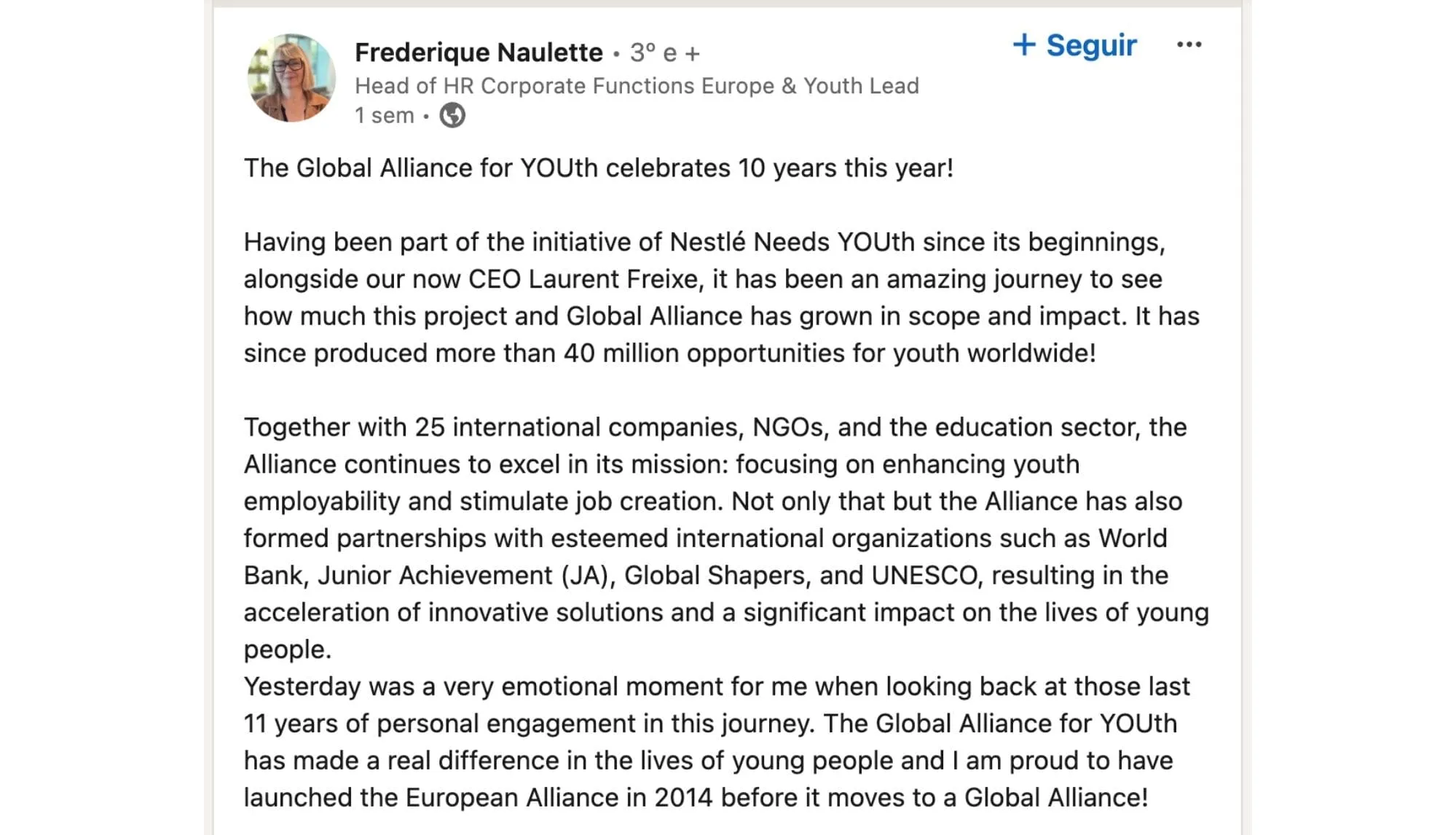
Nina Kruchten leads Nestlé’s global philanthropic programs, focusing on economic opportunity and community impact. She ensures that Nestlé’s community investments align with its business goals, supporting STEM education, workforce development, and economic empowerment in underserved communities.
Nestlé’s strategy supports inclusivity, economic equity, and community engagement, driving positive change.
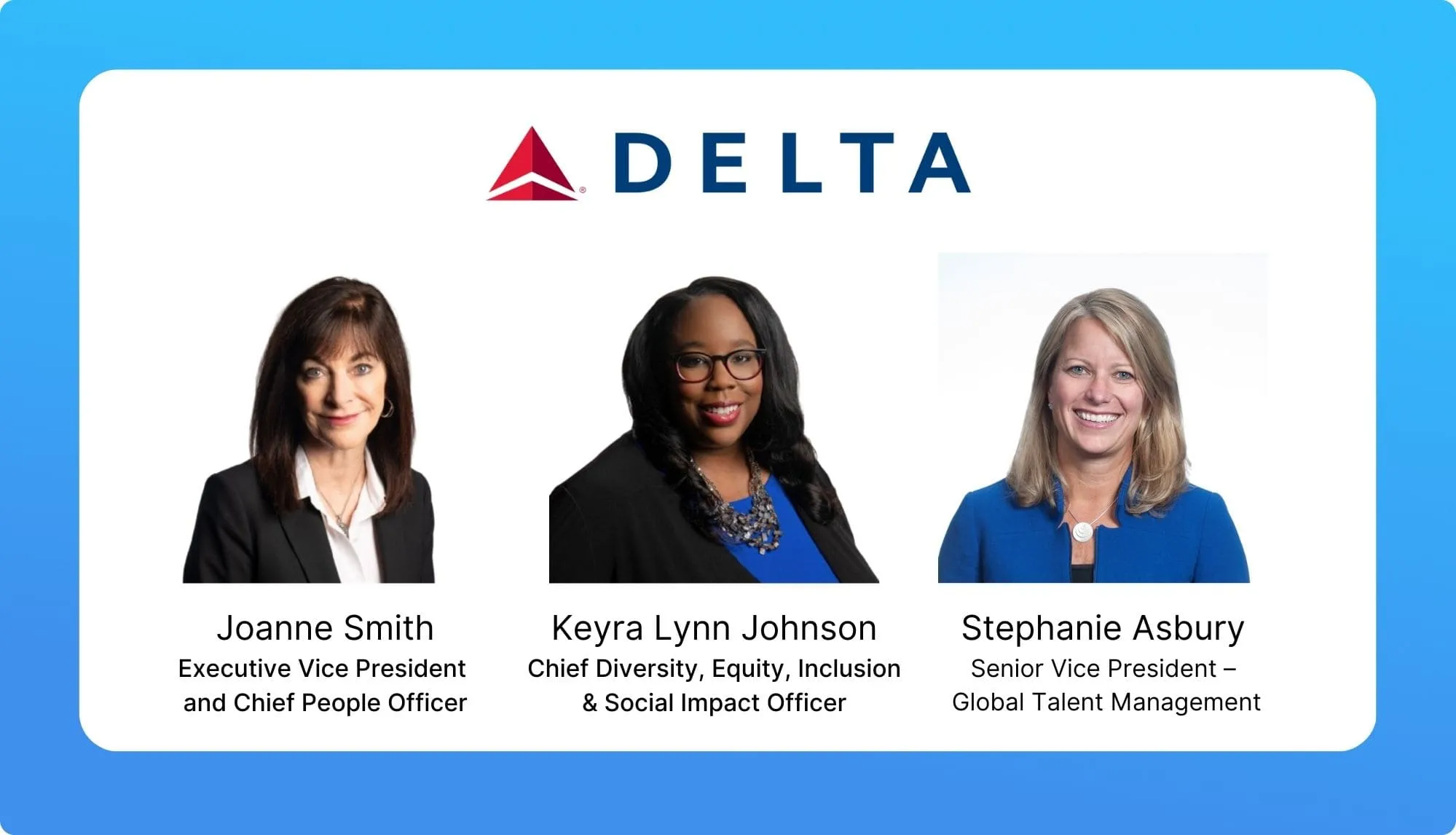
Since 2002, Joanne Smith has led Delta’s talent management and DE&I initiatives for over 100,000 employees. Her advocacy for a people-first culture has earned Delta recognition as a top workplace by Forbes, Newsweek, and Glassdoor. She has played a pivotal role in Delta’s Close the Gap strategy, ensuring equitable representation of women, Black, and Hispanic talent in leadership.
With over 25 years at Delta, Keyra Lynn Johnson leads the company’s Diversity, Equity & Inclusion (DEI) strategy. Her efforts to ensure diversity are central to Delta’s culture, earning her recognition as one of the Top 50 Women in Travel and a Top 100 Diversity Officer. Keyra’s work extends beyond the company, impacting Delta’s employees, customers, and communities.
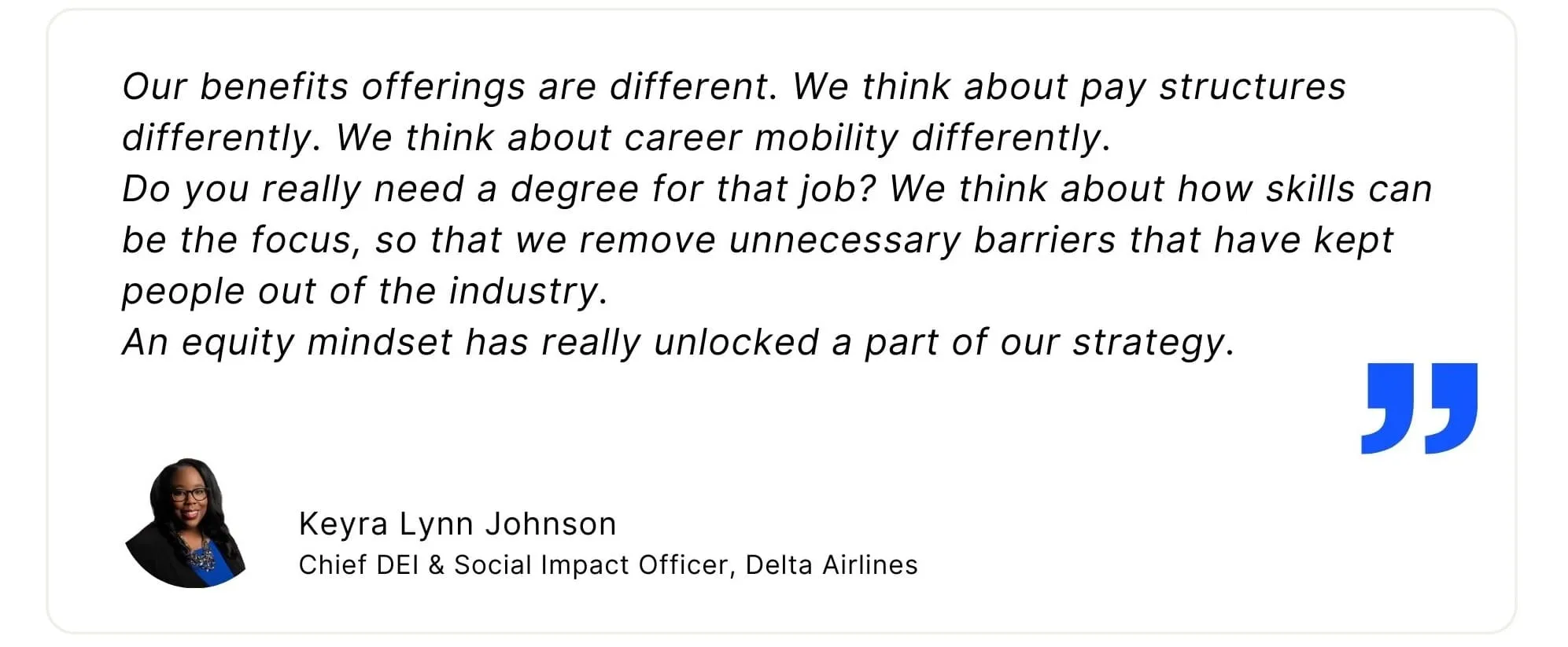
Stephanie Asbury oversees Delta’s talent development and employee engagement, ensuring a pipeline of future leaders. She also contributes to Delta’s DE&I initiatives, serving on the Corporate Diversity Council and Human Trafficking Steering Committee, which drives inclusivity and addresses key societal issues.
Delta’s focus on employee development, sustainability, and community engagement highlights its commitment to driving positive change in aviation and beyond.
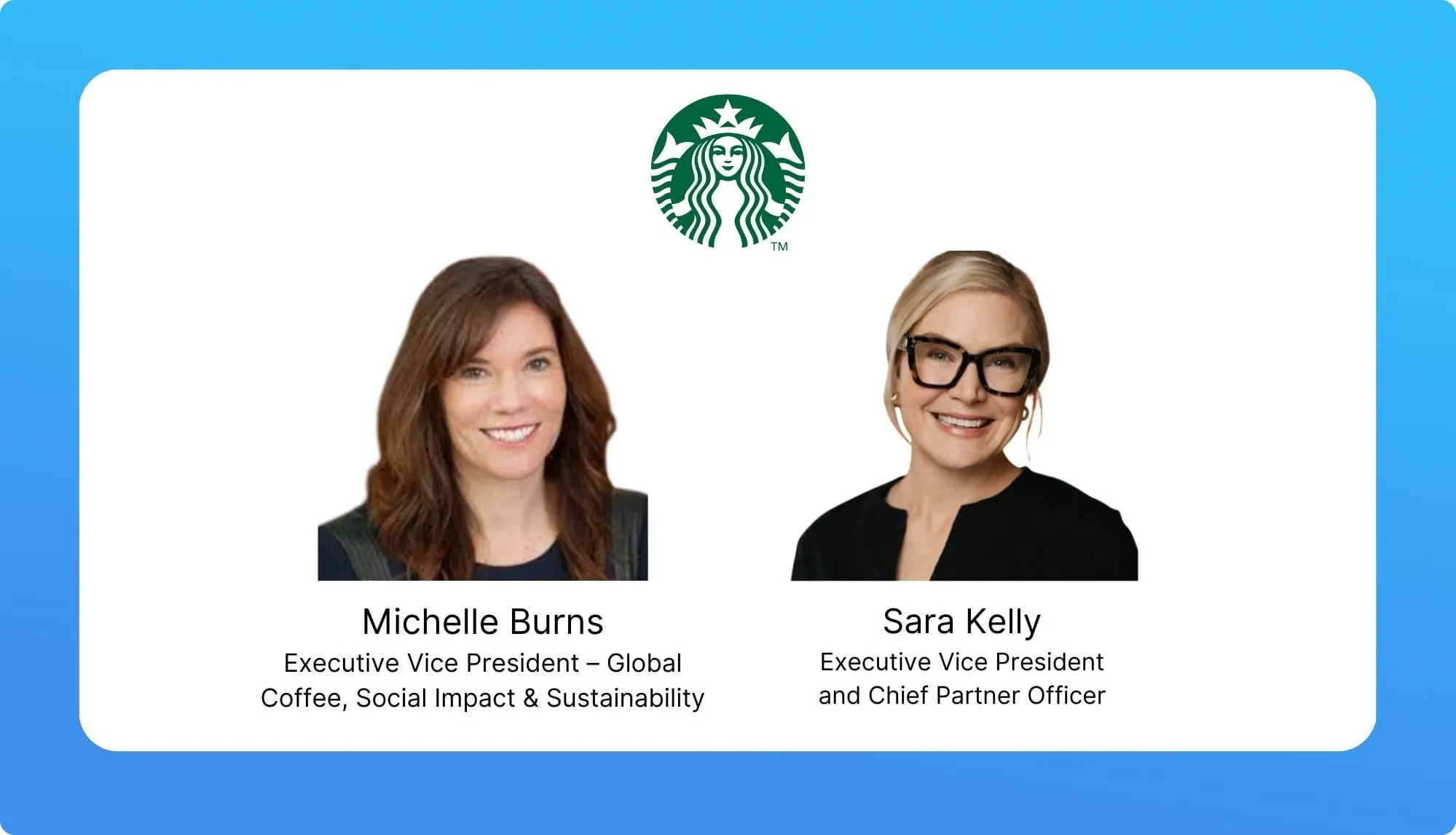
Michelle Burns leads Starbucks’ CSR efforts, focusing on diversity, equity, and inclusion (DEI). She champions the growth of women in the male-dominated coffee industry through mentoring and leadership opportunities. Under her leadership, Starbucks empowers employees to nominate local organizations for grants, expanding the company’s social impact, particularly in underserved communities. Her work aligns Starbucks' mission with sustainability and social responsibility, driving change in the coffee industry and beyond.
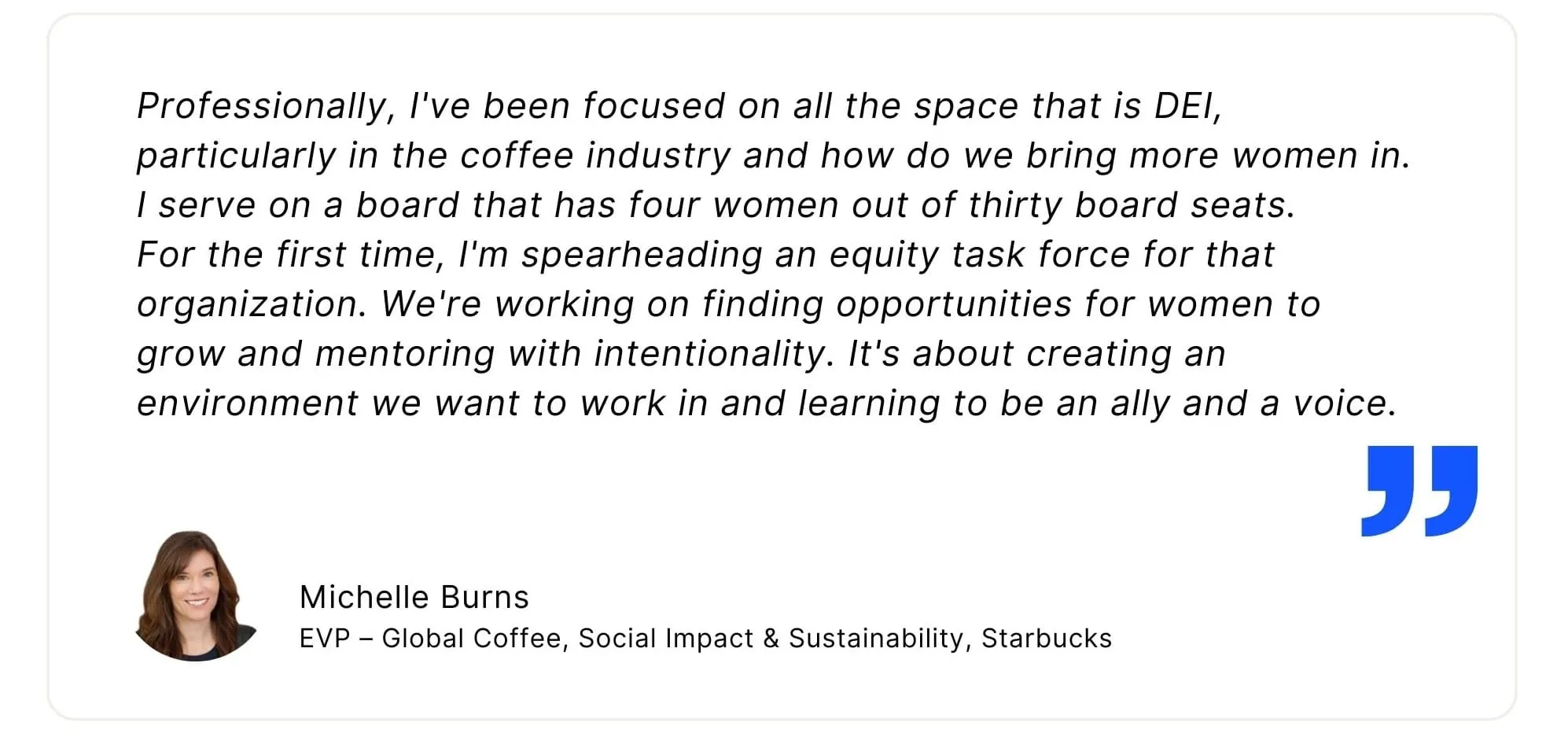
Since joining Starbucks in 2001, Sara Kelly has overseen the growth of Starbucks' global workforce. She helps employees (partners) realize their full potential, emphasizing inclusive growth opportunities. Sara played a critical role in Starbucks' transition to a hybrid workforce and leads initiatives like the Women’s Impact Network, which supports women's leadership and mentorship. Her focus on creating a welcoming, inclusive workplace continues to shape Starbucks' positive work culture.
Starbucks remains dedicated to making a positive impact, fostering a culture that supports both employees and the communities it serves.
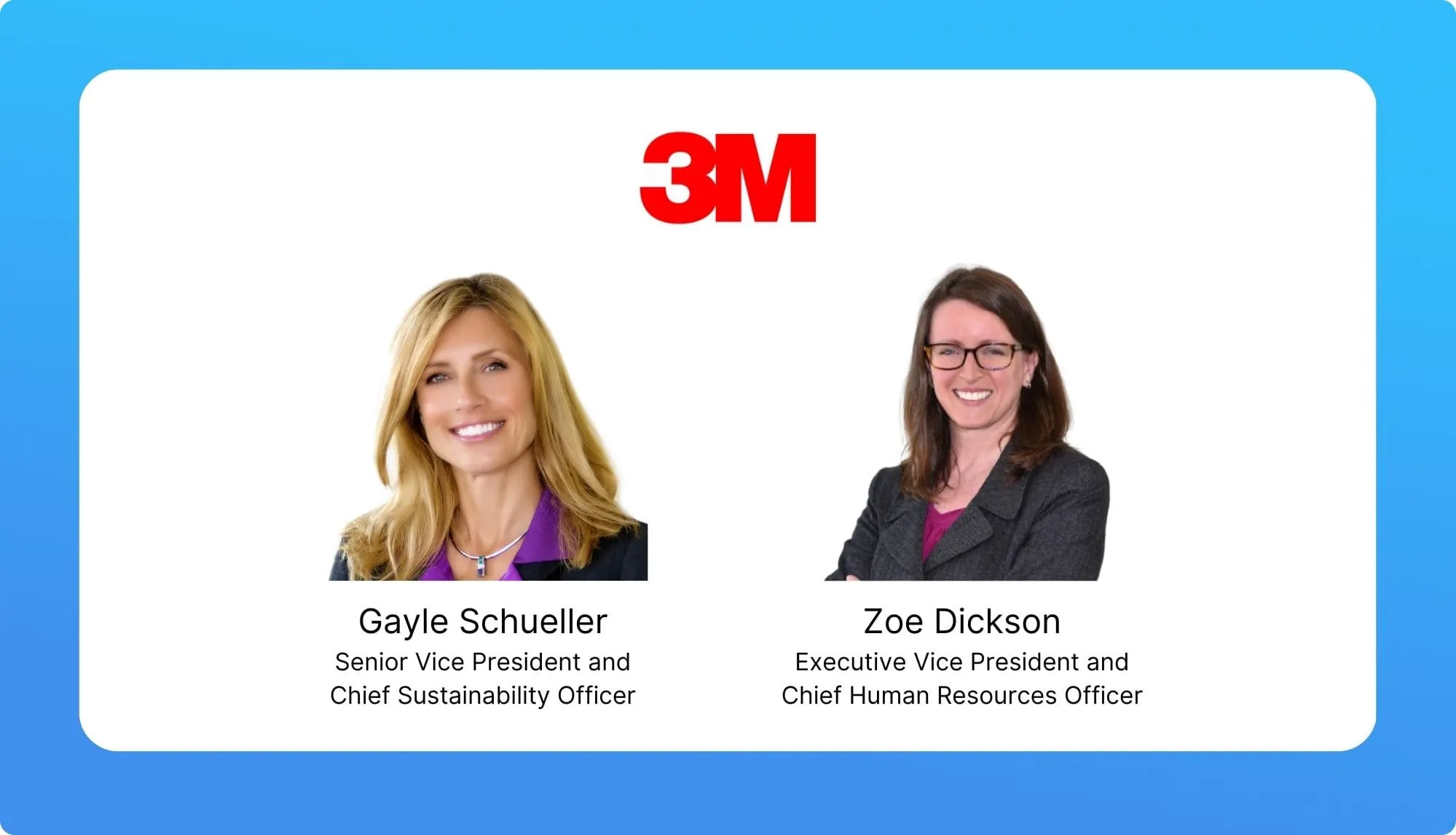
Dr. Gayle Schueller, with over 29 years at 3M, leads the company’s sustainability efforts across various industries. She oversees initiatives that address climate, circularity, and community impact. A notable initiative is 3M’s $50 million commitment to address racial opportunity gaps and create 5 million STEM learning experiences for underrepresented individuals by 2025. Her leadership has positioned 3M as a leader in sustainable innovation benefiting both the planet and marginalized communities.
Since 1998, Zoe Dickson has led 3M’s global HR operations, focusing on total rewards, talent, and diversity strategies. She plays a key role in fostering an inclusive workplace aligned with 3M’s broader goals of economic equity and workforce development. Her leadership supports 3M’s investment in STEM education and skilled trades training, contributing to the company’s goal of creating 5 million STEM learning experiences by 2025.
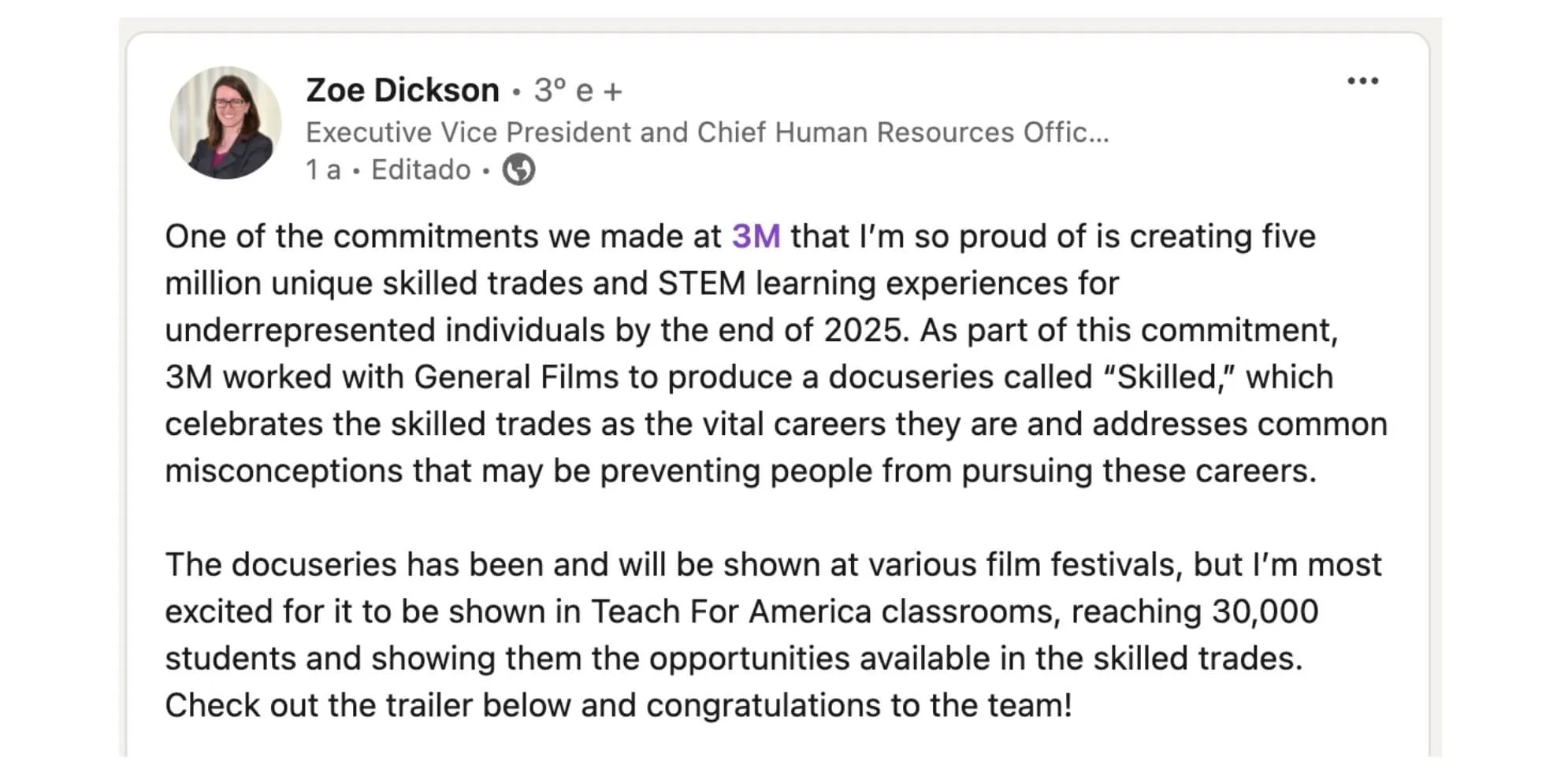
Through these programs, 3M leverages science and technology to address global challenges while empowering underserved populations.
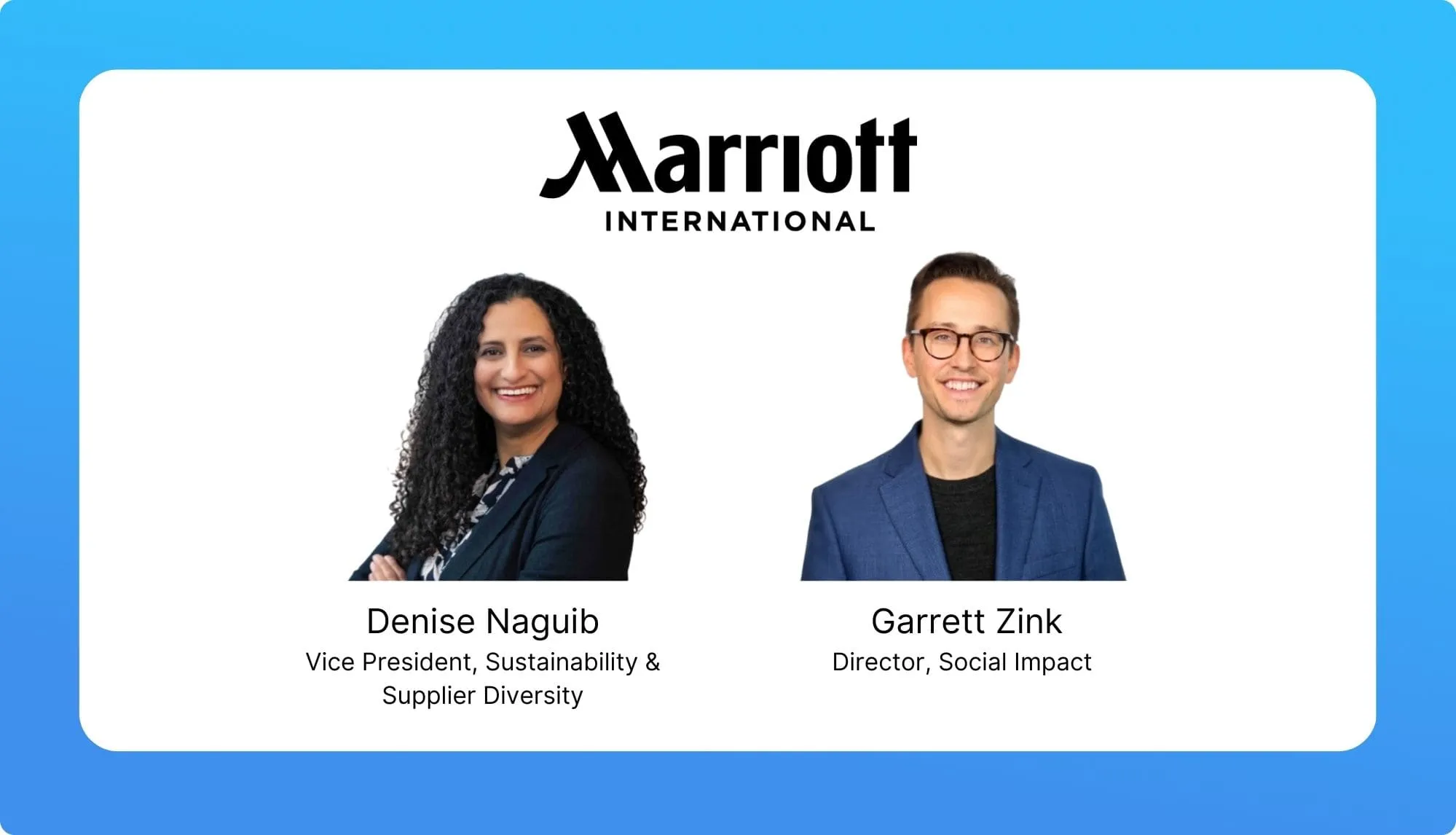
Since 2010, Denise Naguib has led Marriott’s sustainability and supplier diversity efforts, aligning operations with the United Nations Sustainable Development Goals (SDGs). She drives initiatives like the Youth Employment Program, equipping vulnerable young people with skills for careers in hospitality. Her "Empower Through Opportunity" initiative provides job training and opportunities for diverse groups such as women, veterans, and refugees.
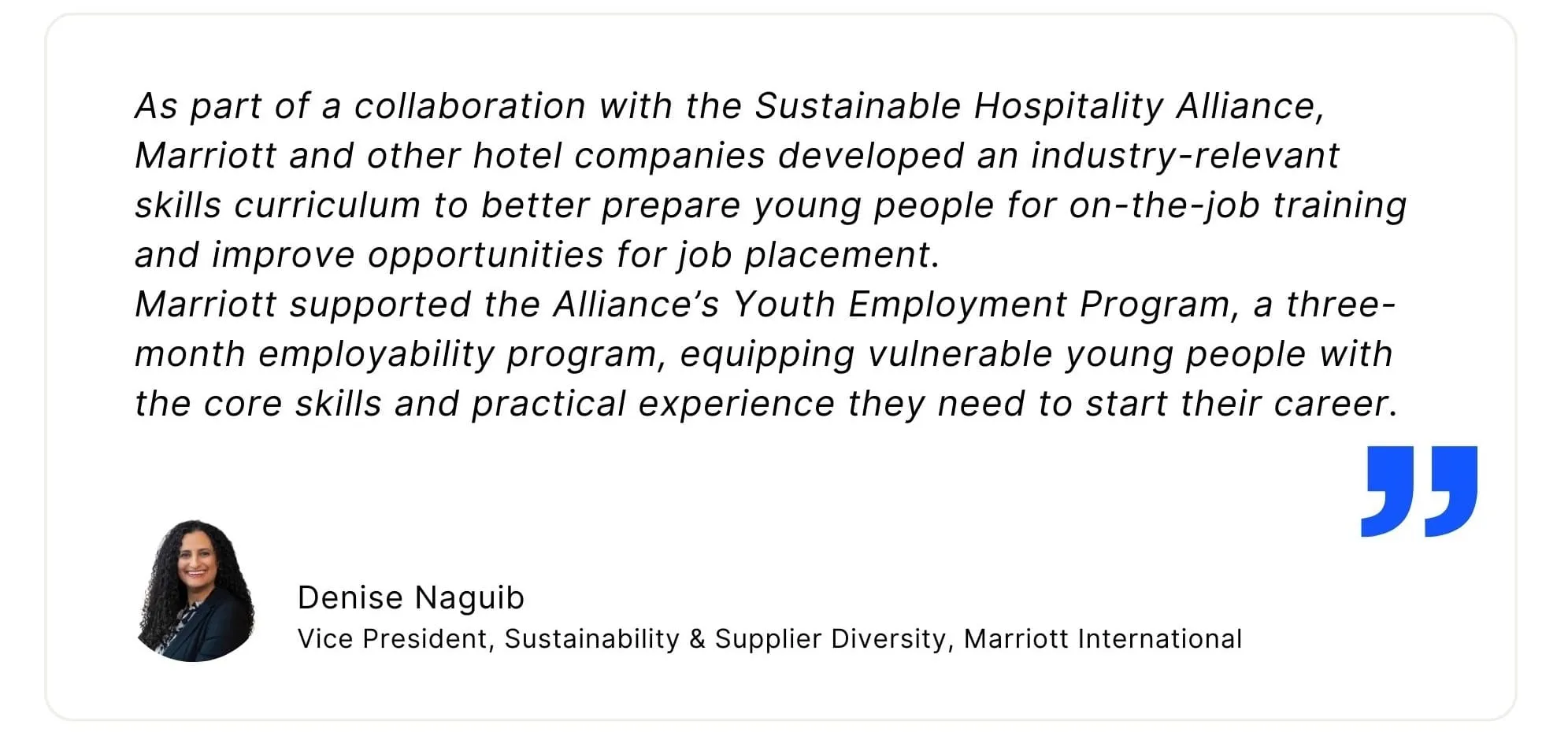
Garrett Zink manages Marriott’s strategic nonprofit partnerships and aligns social impact initiatives with the company’s ESG strategy. He focuses on sustainability and community engagement within Marriott’s broader Serve 360 platform, ensuring measurable social innovation and alignment with global responsibility goals.
Through Serve 360, Marriott drives positive change for communities and aligns its business with the United Nations SDGs.
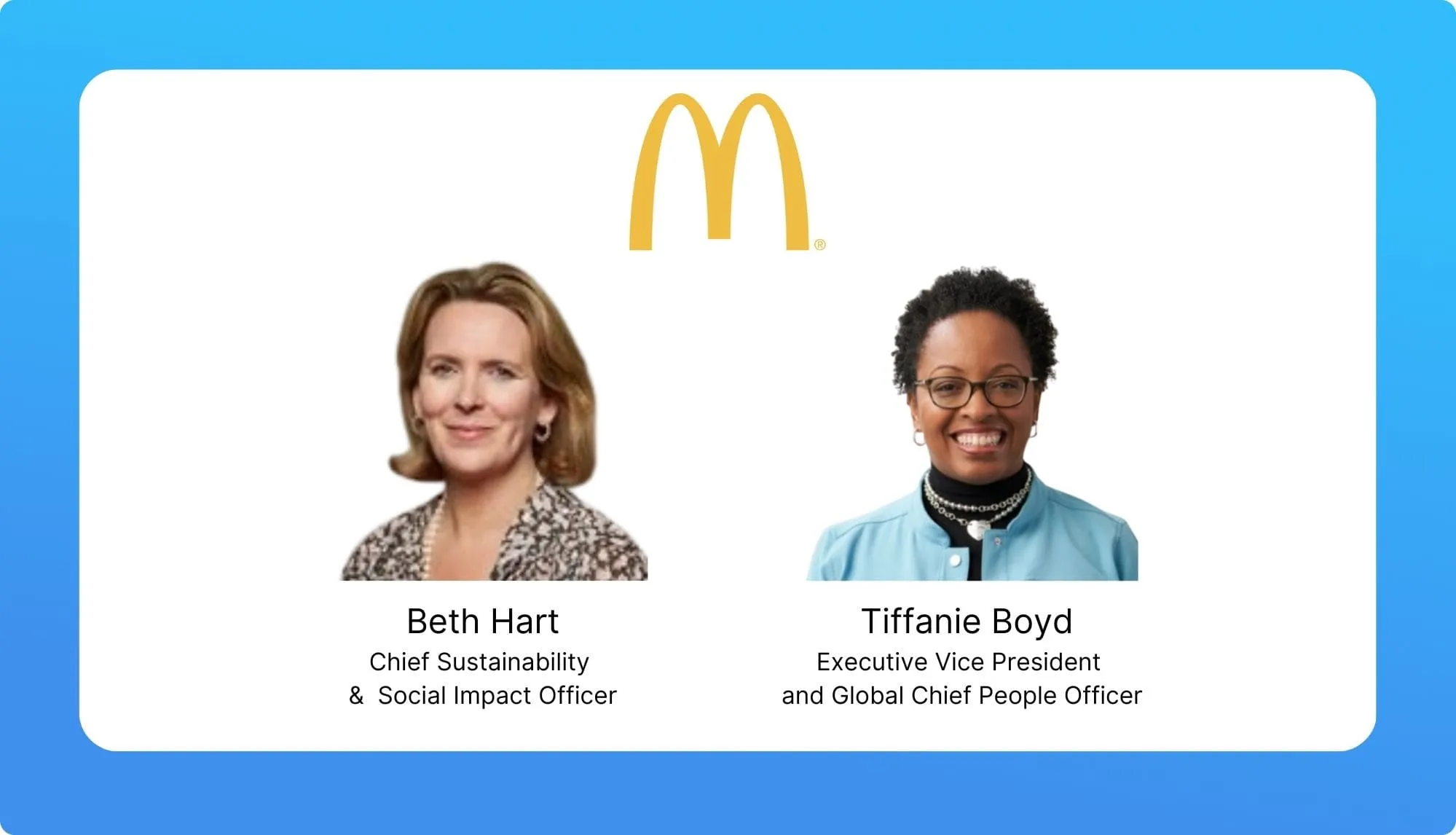
Beth Hart leads McDonald’s sustainability and social impact efforts globally. She oversees the company’s Impact Strategy, which focuses on four areas: Our Planet, Food Quality & Sourcing, Jobs, Inclusion & Empowerment, and Community Connection. Under her leadership, McDonald’s has reduced its environmental footprint and promoted ethical sourcing. She has also expanded opportunity employment, surpassing a goal of helping 2.2 million young people through training and job programs. Additionally, Beth supports community-driven initiatives like Ronald McDonald House Charities.
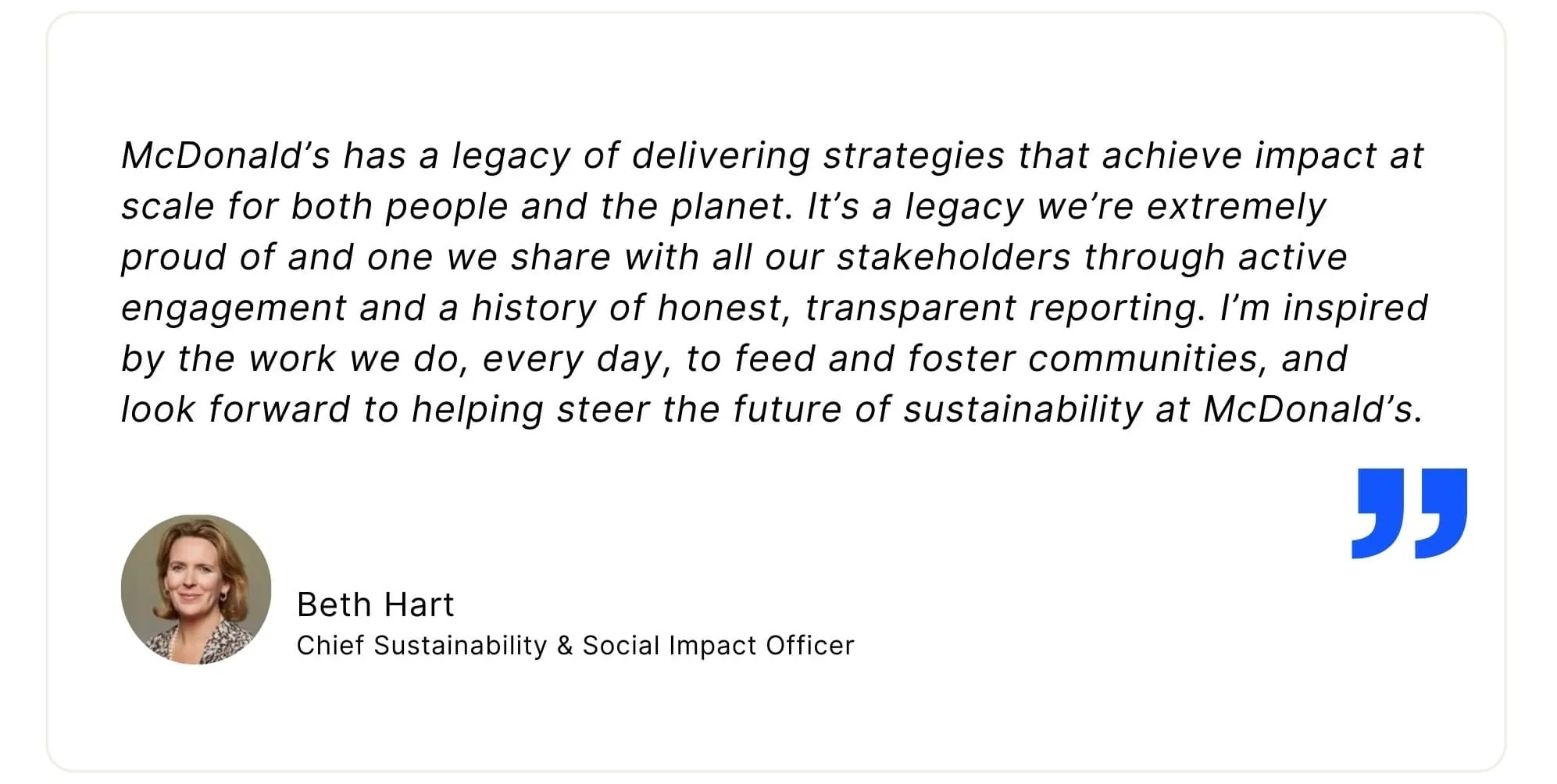
Tiffanie Boyd leads McDonald’s global people strategy, overseeing talent management, DE&I, and organizational culture for 2 million employees. Since joining in 2021, she has focused on leadership development, retention, and diversity. Tiffanie’s initiatives have strengthened McDonald’s DE&I strategy, ensuring that its workforce reflects the diversity of its communities.
Through these efforts, McDonald’s creates a lasting impact on employees, customers, and the planet.
As automation and AI reshape industries, CSR leaders must prioritize digital education and reskilling to ensure employees and communities stay relevant in a rapidly evolving workforce. The shift to lifelong learning is especially critical for marginalized groups, who often face barriers to accessing such training.
The future of workforce development goes beyond job readiness—it’s about embedding continuous skill development into corporate strategies. Leaders must focus on building resilience through ongoing education, ensuring that employees can adapt to technological changes.
To expand or start CSR reskilling programs, companies can take the following steps:
Collaboration across sectors—between businesses, governments, and educational institutions—will be vital for driving systemic change. CSR leaders are well-positioned to lead this transformation, creating sustainable pathways for success in the digital economy.
The leaders transforming workforce development through digital reskilling show the pivotal role companies play in shaping the future of work. NoCode Institute is the ideal partner to help your organization make a meaningful impact.
NoCode Institute offers scalable digital reskilling programs designed to equip individuals with the skills they need to thrive in today’s tech-driven economy. With a deep commitment to social impact and customized solutions, NoCode Institute empowers companies to foster inclusive growth and drive community empowerment.
Whether you’re looking to start or expand reskilling initiatives, NoCode Institute provides tailored solutions to meet your workforce needs. Partner with NoCode Institute today to unlock innovative, impactful solutions that will help your organization make a lasting difference.
Looking to re-invent yourself and turn your talent into a career? Stay up to date with the latest.